
Valuing Volunteers June 2024 | saltmagazine.org.nz Matariki Better together Rhythm of rest A new season
8 Aroha Mai; Aroha Atu
For National Volunteer Week, Kelly Cooper delves into the crucial and invaluable role that volunteers play at The Salvation Army.
12 He Leadeth Me
Drew Bishop shares about volunteering at Dannevirke Corps and a growing relationship with God.
16 Introducing Our New Area Officers
Explaining the changes in area leadership for The Salvation Army and introducing the new area officers.
20 A Season for Everything
Richard Kerr-Bell considers the significance of Matariki in light of The Salvation Army's recent structural change.
26 Pushing Pause
Part one in a series on the biblical framework for Sabbath rest.
28 Healthcare for All
The Salvation Army’s Hauora Service is providing affordable healthcare for the South Auckland community.



SALT Magazine
The Salvation Army New Zealand, Fiji, Tonga and Samoa Territory
Territorial Leaders
Commissioners Julie and Mark Campbell
General
Lyndon Buckingham
Founders Catherine and William Booth
Editor
Vivienne Hill
Graphic design
Sam Coates, Nicole Gesmundo, Lauren Millington
Staff writers
Jules Badger, Kelly Cooper, Captain Rachel Montgomery
Proof reading
Colleen Marshall, Glenys Fairhurst
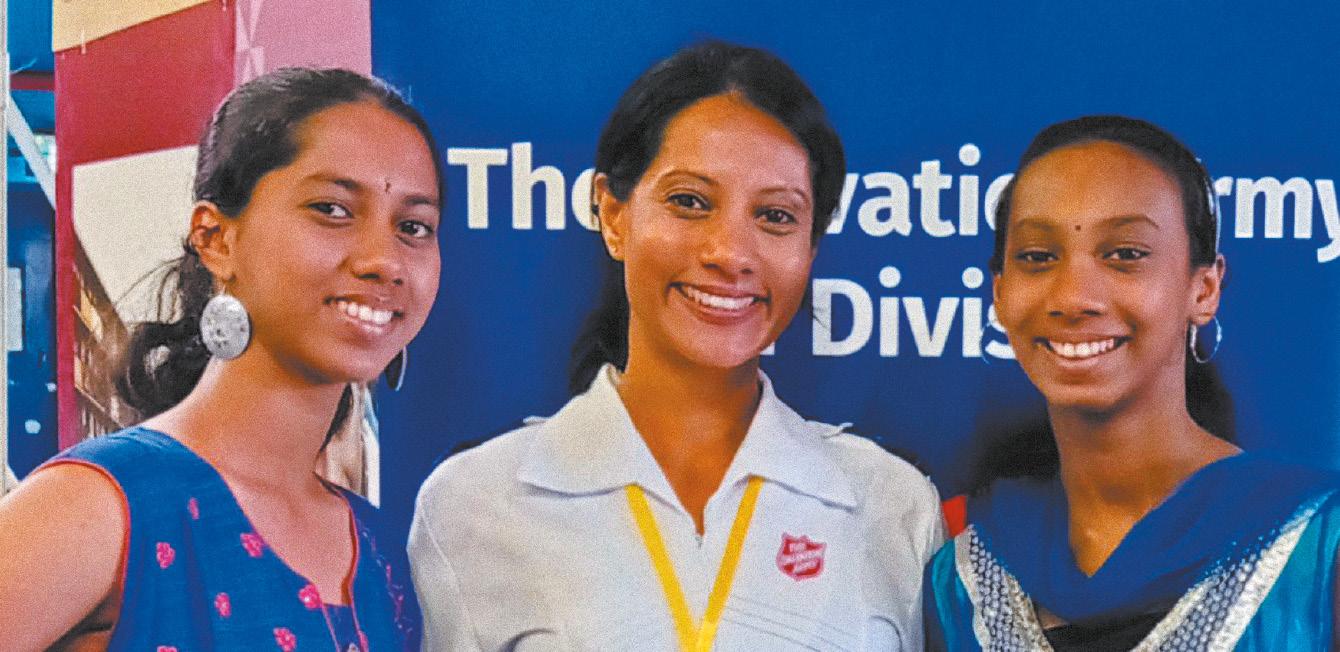

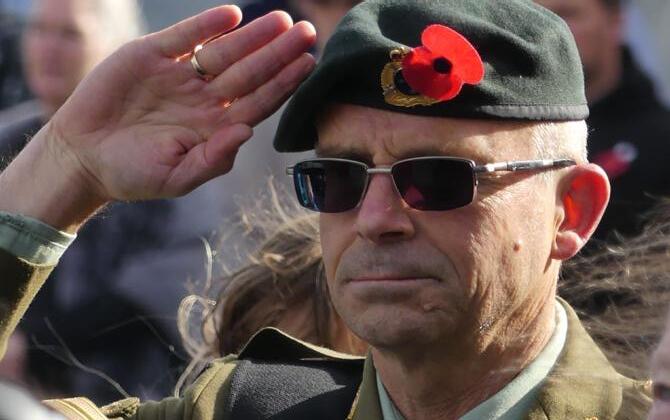
Connect with us saltmagazine.org.nz
SaltMagazine @SaltMagazineNZ salvationarmynzfts Territorial Headquarters, 204 Cuba Street, PO Box 6015, Marion Square, Wellington 6141
p: (04) 384 5649
e: salt@salvationarmy.org.nz
Subscriptions mailorder@salvationarmy.org.nz
Print Management MakeReady
All Bible references from the Holy Bible, New International Version, unless otherwise stated.
Views and opinions expressed do not necessarily represent those of The Salvation Army.
Articles are copyrighted to The Salvation Army, except where indicated, and may be reprinted only with permission.
05 12 26 08 30 18
15
Publishing
years Volume 3, Issue 14 ISSN 2816-1351 (Print) ISSN 2816-136X (Online)
for 140
Contents 2 June 2024
A Shout-out to Volunteers
olunteering is a way of life in The Salvation Army across our territory. Our corps (churches), Community Ministries centres, Family Stores and other expressions of faith and mission are well supported by volunteers (see page 8).
The month of June is an opportunity for all of us to pause and take time to thank each person who chooses to volunteer at The Salvation Army. They may be people who offer a one-off to collect for our Red Shield Appeal, or a regular weekly slot at the Family Store, packing food parcels in a Community Ministries or helping to set up for Sunday services in a corps. Each person who volunteers has chosen to support the work we do and sacrificially give their time and skill in service to others.
I was looking at the statistics for volunteering in New Zealand and came across a thoughtprovoking quote by Dave Glynn: ‘Don’t ever question the value of volunteers. Noah’s Ark was built by volunteers, the Titanic was built by professionals.’ This quote is a good reminder that the history of volunteering is as old as time itself. The Christian Church worldwide is largely run by volunteers, and this from its very beginnings.
The future also relies on volunteering, Jesus is calling all of us into a volunteer position. It is into the harvest field. In the Bible, in Matthew 9:36–38, Jesus has been teaching in the towns across his region, it says: ‘When he saw the crowds, he had compassion on them, because they were harassed and helpless, like sheep without a shepherd. Then he said to his disciples, “The harvest is plentiful but the workers are few. Ask the Lord of the harvest, therefore, to send out workers into his harvest field”.’ We each have the ‘harassed and helpless’ around us. What better way to volunteer than to participate in bringing hope and help to those who have none.
To each person who volunteers for The Salvation Army: you are participating in bringing hope and help with the work you are doing. Your contribution is of great value and we are thankful that you partner with The Salvation Army to care for people, transform lives and reform society by God’s power … thank you!
Vivienne Hill Editor
Each of you should use whatever gift you have received to serve others, as faithful stewards of God’s grace in its various forms. 1 PETER 4:10
saltmagazine.org.nz 3
WORD OF THE MONTH Malosi
(Samoan, noun) Strength.
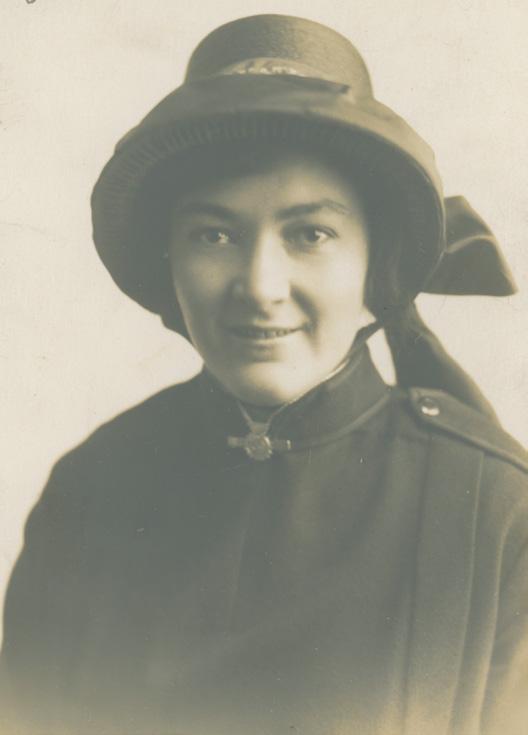
Do You Know This Person?
If you recognise the person in this photo, we’d love to hear from you. Email: archives@ salvationarmy.org.nz

What’s On?
Fiji Men’s Camp 07–09 June Modern Slavery and Human Trafficking Response Training

10 June at Hutt City Corps; 11 June at Newtown Centre; 12 June at Porirua Corps.
Tonga Amplify Arts Camp 24–29 June
INTRIGUING INDEX
Focus on the Stars
1 When stars collide
The Milky Way consists of a vast collection of stars, planets, gas and dust. It is directly on a collision course with the Andromeda Galaxy, and they should collide in about 4 billion years, forming a mega-galaxy.
2 Noisy neighbours
The sun actually produces a sound, in the form of pressure waves. These are far beyond the range of human hearing, so don’t bother listening out for them.
3 Star tracking
During the late second millennium BC, the oldest known star catalogues were compiled by ancient Babylonian astronomers. Living in what is now Iraq, these early astronomers carefully recorded the positions of stars and solar objects.
4 The sun shines brightest
Due to its proximity to Earth, the sun is our brightest star, but the sun’s brightness is relatively modest compared to many other stars in the universe. It is considered a middle-aged star as it is only 4.5 billion years old.
5 Matariki matters
On June 28, in Aotearoa, we celebrate Matariki to mark the beginning of the Māori New Year. While the Matariki star cluster is one of the closest to Earth, it is still 440 light-years away. It is made up of over 500 stars, only a handful of which are visible to the naked eye.
4 June 2024

Chicken Tagliatelle with Parsley
Lemon Butter
This light and delicious pasta dish makes a little bit of chicken go a long way. I usually shred the cooked meat with two forks which results in a delicate yet filling meal. Adjust the flavours to suit your own personal taste.
Ingredients
• Tagliatelle or other pasta ribbons for 4–6 people, dried pasta is fine
• 350g cooked boneless chicken, in small thin slices or shredded with two forks
• ⅓ cup butter, cut in pieces
• 2–3 Tbsp lemon juice
• Zest of a lemon
• 2 Tbsp chopped parsley
• 2 cloves garlic, crushed
• ¼ cup starchy water pasta was cooked in
• Grated parmesan cheese to serve (optional)
Method
Cook the pasta till al dente. For fresh pasta, allow around three minutes in boiling salted water.
Drain the pasta lightly and return to the pan. Add a good chunk of the butter and all the garlic and toss through the hot pasta. Grate in the lemon zest and add some of the juice.
Fold in the sliced or shredded chicken and add a dash of the pasta water to moisten the pasta. Add the parsley and toss well. Taste and add more butter or lemon if you feel you need it.
Serve immediately with grated parmesan, if desired.
Tips: This is a really good way to stretch your leftover cooked chicken, but you could also use fish, such as tuna, or whatever you prefer. Any long pasta is suitable and sometimes a good dried pasta is more delicate and lovely when cooked than the tough fresh pasta sold in the supermarkets.
Source: Sophie Grey | destitutegourmet.com
QUICK QUIZ
1 Who was the first Māori woman elected to NZ Parliament?
2 In the Bible, in Revelation, how many days will the two witnesses prophesy for?
3 What do you call a flag expert?
4 What is a grouping of leopards called?
5 Which southern Italian city is usually credited as the birthplace of the pizza?
Answers page 32
Patience is a bitter plant that produces sweet fruit.
CHARLES SWINDOLL
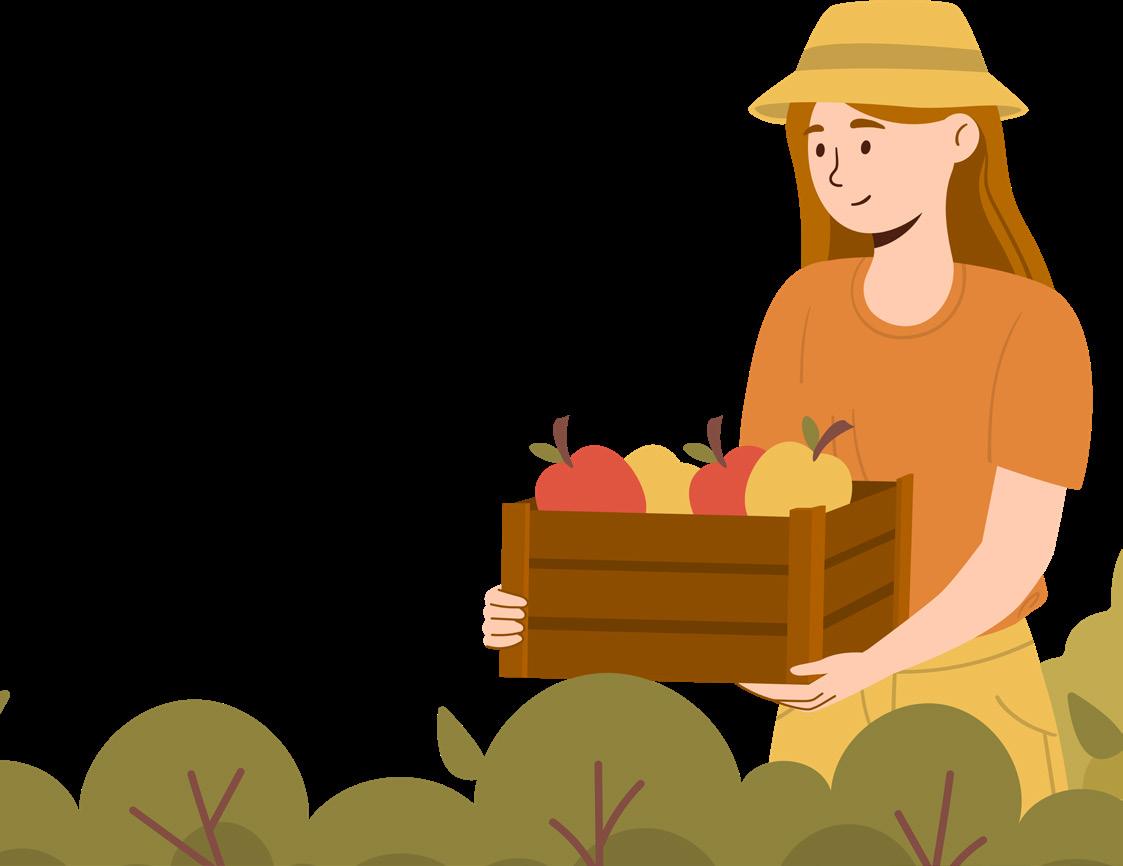

INTERNATIONAL PRAYER

• Haiti—Seventeen representatives of Christian Aid Ministries were visiting a local orphanage before members of the notorious ‘400 Mawazo’ gang seized their bus and kidnapped them and their children, demanding a large ransom. Please pray they are released unharmed.
• Democratic Republic of Congo Extremist groups are targeting Christian girls and women who are being abducted, raped and forced into unwanted marriages. Please pray for the protection of the Church in this nation and for church leaders who speak out on behalf of the victims and are targeted accordingly.
• Assam, India—The right to pray for healing has been outlawed in Assam, and Christian’s rights are further being eroded in this place. Please pray for protection of the Christian minority in Assam.
• Myanmar—The military council in Myanmar recently burnt down five churches and displaced a Christian village by destroying their houses. Please pray for the Christians in Myanmar as they face increasing levels of targeting and persecution.

Prayer focus: Volunteering during conflict and disaster
SALVATION ARMY PRAYER
Police Chaplains; Porirua Corps; Property Department; Pukekohe Corps; Queenstown Corps; Raiwai Corps; Rakiraki Corps Plant; The Salvation Army in Zambia; and The Salvation Army in Zimbabwe and Botswana.
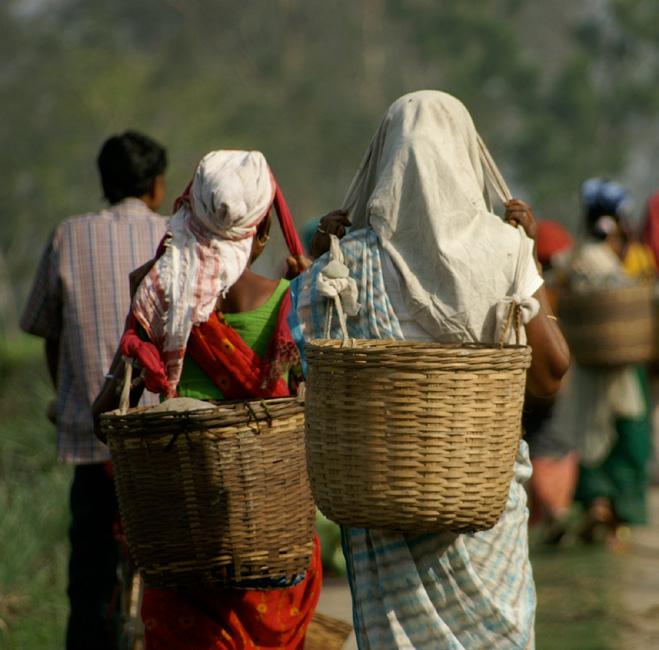
Just like in The Salvation Army, many organisations and groups around the world benefit from the generosity of volunteers who give their time, care and resources to help others. During times of conflict and natural disasters, volunteers can play a vital role in the efforts to provide aid, support those in need and work to rebuild the communities. However, volunteering during points of crisis can bring unique dangers and difficulties for those involved.
• Pray for protection—that God’s power and protection will cover people in dangerous situations, sheltering them from physical and spiritual harm.
• Pray for care and comfort—for God to protect the hearts and minds of those who volunteer in difficult and often heartbreaking situations. Pray that they will feel God’s presence near to them as they care for others.
• Pray for provision—as volunteers give so much of themselves to their communities. Pray for God’s abundance for their situations. Pray for practical support for their families and their financial situations.
• Pray for hands—asking God to speak to those who may have a gift to share through volunteering. Reveal opportunities to volunteers and give them energy and passion to help others in need.
6 June 2024
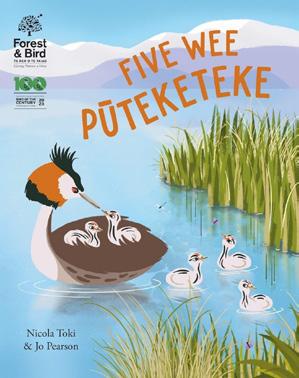
Five
Wee Pūteketeke
Non-fiction/Picture book | Nicola Toki, Jo Pearson | Allen & Unwin
Five Wee Pūteketeke is a delightful picture book that follows a pūteketeke whānau (family) learning to live in the roto (lake). Written by Forest and Bird Chief Executive Nicola Toki, the story is based on the ‘Five Little Ducks’ rhyme, which cleverly incorporates conservation messages about this threatened species. Suitable for reading to children from 2–5 years, the picture book pairs easy rhymes with short facts. Complemented by Jo Pearson’s wistful illustrations, Five Wee Pūteketeke teaches readers how the birds slowly disappeared but have been rescued from extinction thanks to the concerted efforts of people willing to build the pūteketeke a new home. A beautiful way to honour Forest and Bird’s dedication to Aotearoa’s manu (bird) and celebrate the pūteketeke—Bird of the Century. (Reviewed by Talya Coates)
Book Giveaway
We have a free copy of the book Five Wee Pūteketeke to give away. To enter the draw, email us at salt@salvationarmy.org.nz before 1 July.
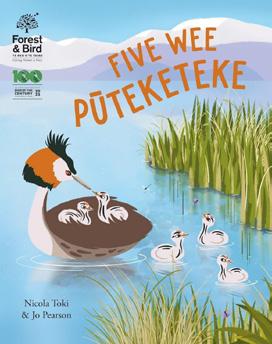
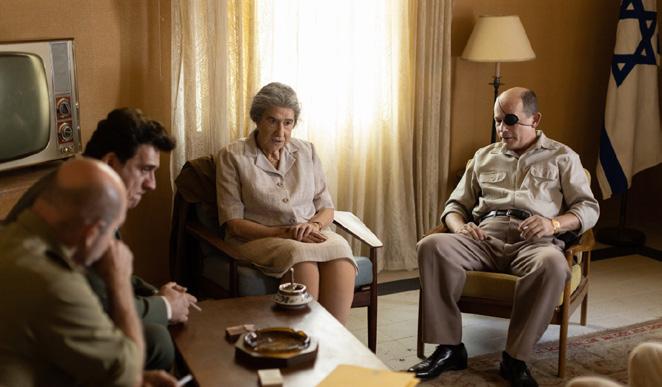
Golda
Biographical drama | Directed by Guy Nattiv | Watch in movie theatres
Golda Meir, Israel’s fourth prime minister and the first female prime minister in the Middle East, has long been lauded as a woman of tenacity and strength. This film covers the political events of the Yom Kippur War in 1973, the resultant investigation into Golda Meir’s handling of the events, and the aftermath. Helen Mirren’s portrayal of Golda is a prospective award-winning performance. Her physical transformation with sensible shoes and ever-present handbag reinforces the maternal caring side of Golda, while her actions portray steely determination and psychological strength as she sends young soldiers into dangerous and often deadly battles. This slow-paced behind-thescenes snapshot is an insightful look at the complexities of Israel’s presence in the Middle East and the resultant political turmoil in which it exists. (Reviewed by Vivienne Hill)
A Huge Effort!

The Next Right Thing
Personal development | Emily P Freeman | Listen on Spotify and Apple Podcasts
If you describe yourself as chronically hesitant, a second-guesser or someone who suffers from decision fatigue, The Next Right Thing podcast might be just what you need. Spiritual director and author Emily P Freeman has created this podcast specifically for those who crave a little space for their soul to breathe so they can discern their next right thing. Emily weaves together storytelling, insightful teaching and spiritual disciplines in this podcast. Some episodes include guests to learn from, while others offer a simple prayer. With a library of more than 300 episodes to choose from, Emily offers something for everyone. Whether you’re navigating a period of transition or patiently considering your next steps, The Next Right Thing podcast could be your next right thing. (Reviewed by Kelly Cooper)
Thank you! You and many others joined together, volunteered and helped during this Red Shield Appeal. Every gift received from our faithful supporters goes towards helping to transform the lives of those we encounter, as well as their children and whānau (families). The Street Week collection achieved 90 percent of its target, which is an increase from last year and an amazing result in this economic climate—but more than that, collecting week was full of opportunities to connect with local communities. The Red Shield Appeal supports vulnerable New Zealanders with wraparound care, food support, budgeting advice, counselling and advocacy. Thank you again for the part you have played!
saltmagazine.org.nz 7
Aroha Mai; Aroha Atu—Love Received; Love Returned
New Zealand is a nation of volunteers with a long history of ‘mucking in’ and getting the job done. More than 50 percent of Kiwis volunteer in some capacity to make a positive difference in our communities. They account for more than 159 million hours of volunteer labour each year. As we honour volunteers during Te Wiki Tūao ā-Motu—National Volunteer Week from 16 to 22 June, SALT delves into the crucial and invaluable role volunteers play in supporting The Salvation Army to live out its mission.
WORDS Kelly Cooper
illiam and Catherine Booth founded The Salvation Army with the help of volunteers, who generously devoted their time and skills to assist East London’s most marginalised and vulnerable people. Volunteers played such a crucial role in the movement, that early on The Salvation Army earned the name ‘The Volunteer Army’ from observers. Today, volunteering remains at the heart of our movement as The Salvation Army continues to provide practical support which is only possible because of the effort and dedication of our volunteers.
The New Zealand Charities Service defines volunteers as ‘people who provide their time and services to charity free of charge’. Volunteer work within The Salvation Army encompasses a range of roles including corps (church) and volunteers, Community Ministries, emergency management, Family Stores and annual appeals as well as many other ad hoc roles.
Who are our volunteers?
A ‘Review of Volunteering’ conducted for Community Ministries in 2023 revealed that The Salvation Army boasts over 3200 dedicated registered volunteers nationwide, as well as countless others who volunteer in less formal capacities. Volunteers come from all age groups, with retirees making up the largest portion: more than half of our volunteers are 65 years old or older. Volunteers are not just individuals, they come with their schools, their whānau (families), their marae and their communities.
‘The Salvation Army is dependent on volunteering,’ says Principal Advisor for Social Mission Kate Misa. ‘Our volunteers support our social service delivery and enable income generation. Without volunteers, The Salvation Army would not achieve its mission and we would not exist as a movement.’ Workforce Development Coordinator for Social Mission Davina Plummer adds, ‘Many volunteers help in multiple places and are connected and serve in lots of different
8 June 2024


basis. There are many opportunities to contribute in different ways as a volunteer.’
Love received; love returned
ways.’ She also acknowledges the many volunteer hours that Salvation Army employees contribute above and beyond their paid hours.
The scope of volunteer work within The Salvation Army is vast. Volunteers at Family Stores across the country receive, organise and shelve merchandise. ‘Family Store volunteers account for our biggest human resource and their work literally funds parts of our mission,’ says Davina. Te Kai Mākona is the largest point of engagement with the public for volunteers within Community Ministries. Volunteer roles include wellbeing workers, food shoppers, food collectors, community meal helpers and drivers.
‘Our nationwide Red Shield Appeal is significantly contributed to by volunteers. There are people who collect bread from Bakers Delight for our social supermarkets every day of the week,’ says Davina. ‘In many corps people volunteer to make barista coffee, maintain buildings or organise flowers on a weekly
A recent study published by American Psychological Association Journal found that in addition to making an immeasurable difference in the lives of others, volunteering also contributes positively to the health of volunteers. Spending time in service to others provides a sense of purpose, increases self-esteem, strengthens connections with others and is linked to improvements in mental health.
‘Our volunteers love contributing to their communities. They gain significant personal benefits, although this is not why they do it,’ says Kate. ‘Volunteers are motivated by wanting to do good, to give back and make a difference,’ adds Davina.
Dan has been a volunteer at the Newtown Salvation Army Centre in Wellington since January this year. He volunteers almost every day, in addition to studying, and carries out a range of responsibilities. ‘I do a bit of everything, and I really enjoy the variety. I do the bread run, cook food, help in the foodbank,
saltmagazine.org.nz 9
Left: Dan, who volunteers at Newtown Salvation Army; right: Chris Fulford, Community Ministries manager at Hamilton City Corps, speaks to a growing group of volunteers.
spend time talking to people in the drop-in space and do some work at reception,’ says Dan. He describes his volunteer work at The Salvation Army as transformative. ‘Being a volunteer here honestly saved my life. I did the Bridge programme and that’s what led me here. I’ve got so much empathy with our clients because I have been where they are. I know how important and empowering it can be to have a conversation with someone and to feel like you belong. I feel really supported here. Volunteering gives me purpose; it gives me hope.’
Retiree Marie Thérèse is a volunteer at Hamilton City Community Ministries. Drawing on her background as a health professional, she supports customers to make healthy choices with their food shopping. ‘Volunteering makes me appreciate the fortunate life I have,’ says Marie Thérèse. ‘I can’t solve all the brokenness of the world, but I can still make a difference and be the hands and feet of Jesus in this role.’
‘Volunteering gives me purpose; it gives me hope’—Dan, volunteer
Stacey also volunteers her time serving as a welfare worker at the foodbank at Hamilton City Community Ministries. She enjoys supporting her clients to identify their needs and the opportunities to form relationships with families. ‘It can be really difficult to ask for help. I try to be a friendly face when people walk in the door,’ says Stacey. After undergoing spinal surgeries and experiencing a decline in mental health, Stacey began volunteering to regain a sense of contribution. ‘Volunteering gave me something to wake up and to be excited about. To help another person during your own struggles can give you hope and purpose,’ she shares.
Athanasia volunteers as a kids church leader at The Salvation Army Johnsonville. As a corps member she enjoys working with children and supporting them to learn about Jesus. ‘I love being able to disciple and
teach the children and to watch them grow deeper in their faith. Through my volunteer work, I get to connect with the younger members of our church and to learn alongside them,’ says Athanasia.
‘Volunteering opens doors and opportunities and is a way for people to develop skills and to gain work experience before moving on to training or employment,’ says Kate. ‘People volunteer for different reasons. Some want to return the kindness that was extended to them during a rough patch, some want to give back to their community and some can see the difference The Salvation Army is making and want to help.’
Chris Fulford is Community Ministries manager at Hamilton City Corps and has grown his volunteer team from just five last September to 57 and counting. ‘Many of our volunteers need more love than our paid staff. The reasons why some people want to volunteer are different from those seeking paid employment. Some have been through recovery. They can be here as volunteers and learn to function and relate to people again in this capacity. They are valued here, they are loved here, they are our mission,’ says Chris.
‘There is a wonderful connection of humanity in just being together. It has to be experienced to be

10 June 2024
Above: Athanasia volunteers as a kids church leader at Johnsonville Corps.
understood. There’s a transformation that happens in you when you give yourself to helping other people. To stop, breathe and be a human with another human is such a rewarding and soul-filling experience,’ continues Chris.
Volunteers of the future
Davina says, ‘We know that the future of volunteering in New Zealand is changing. Advocates for volunteering across the country have noticed that people need to spend more time in paid employment and that our retired generation are often busy. So, the discussion becomes, how can we invite busy professionals to do micro-volunteering or corporate volunteering? How can we engage people to assist us in ways we might never have considered before?’ Dwindling youth engagement in volunteer activities, an ageing population and declining corps numbers have all contributed to decreasing volunteer numbers in recent years.
‘There’s a reciprocity of love in volunteering’— Davina Plummer
While the ‘Review of Volunteering’ celebrated and recognised the importance of volunteering within the Army, it also highlighted a need for structures and resources to support those who manage volunteers. Corps and Community Ministries centres manage volunteers depending on the size of their team and budget. Locations that do not have a designated volunteer manager seldom have time to prioritise volunteer recruitment and training.
In response to the review, the ‘Mahi Aroha Volunteering Framework’ was created. This framework provides a structure for volunteer managers within The Salvation Army to understand, engage, enable and celebrate their volunteers. Although this is a Community Ministries’ initiative, other teams have been included in its development to ensure the content is relevant to as many mission expressions as possible. ‘There are many people who support
and celebrate their volunteers. Our hope is to build a common understanding and language around volunteering within The Salvation Army,’ says Kate. The whakataukī (proverb) that supports this framework could not be more fitting. It reads: Aroha mai; aroha atu—love received; love returned. ‘There’s a reciprocity of love in volunteering,’ says Davina.
Volunteer appreciation
This year, The Salvation Army is supporting two national campaigns to celebrate, appreciate and honour our volunteers. Te Wiki Tūao ā-Motu—National Volunteer Week from 16 to 22 June, and The Big Shout-Out campaign that runs for the month of June.
‘We want to say a massive thank you to all our volunteers and we want them to know that they are valued and appreciated,’ says Davina. ‘National Volunteer Week is about celebrating our volunteers and the amazing work that they do. It’s also about recognising that they are the heart of our organisation,’ adds Kate. If you are considering volunteering and want to get involved, please contact your local Salvation Army corps, Family Store or Community Ministries.
Get involved
Te Wiki Tūao ā-Motu—National Volunteer Week, 16 to 22 June
This week honours the collective energies and mana of volunteers in Aotearoa. They grow our people, open minds, open hearts and create joy.
#aotearoaofkindness
The Big Shout Out campaign to celebrate volunteers runs for the month of June
The Big Shout Out encourages people to give social media shout outs or a morning tea shout to volunteers.
#thebigshoutout
saltmagazine.org.nz 11
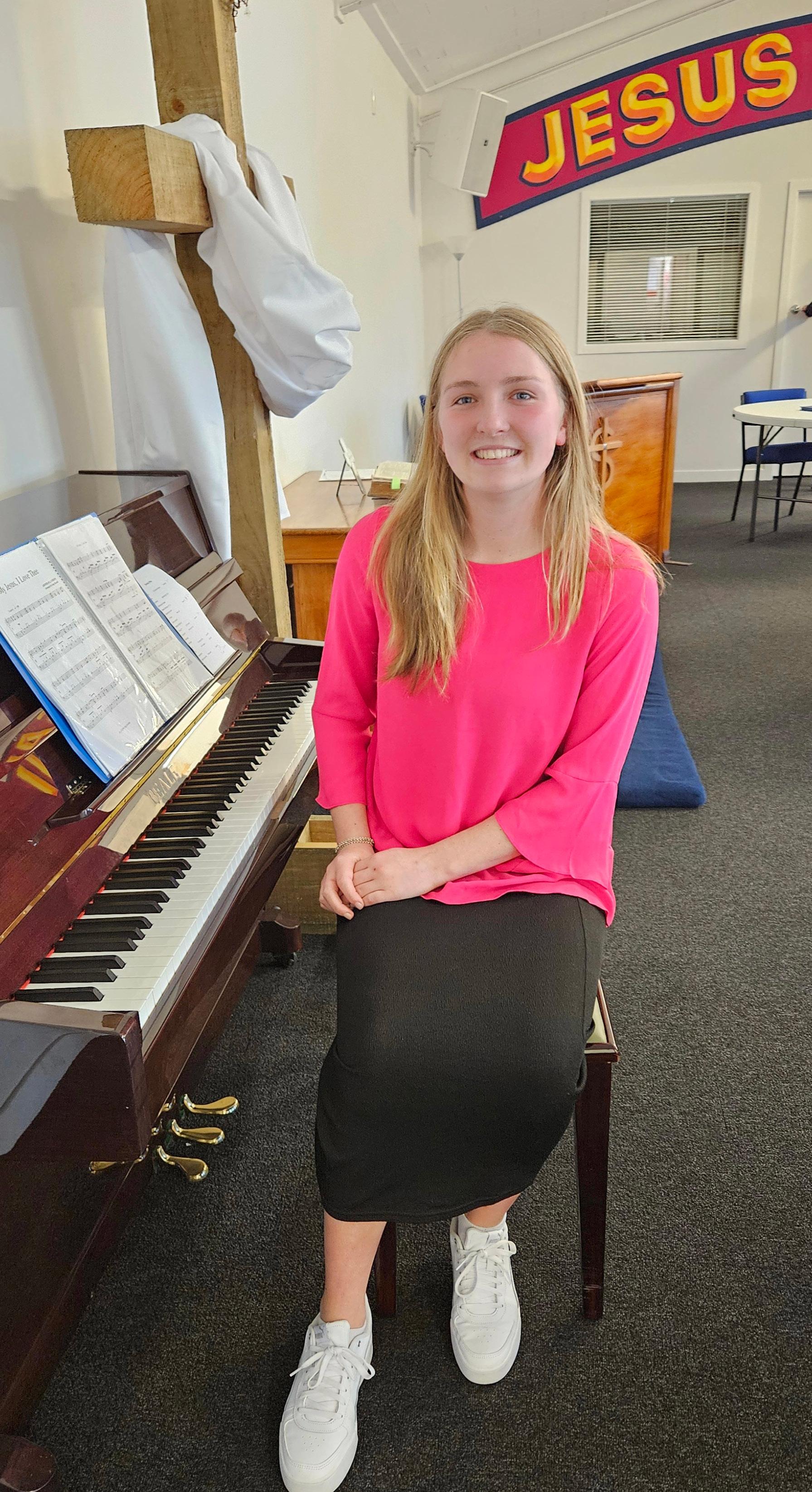
He Leadeth Me
Fifteen-year-old Drew Bishop volunteers to play the piano every week at Dannevirke Salvation Army. Drew has a growing relationship with God and offers some encouragement for other young people who may be struggling to find their place in a small faith community.
‘Don’t be afraid to embrace your faith,’ says Drew. ‘It’s not just for adults. Share your love for Jesus. I don’t mean you have to shout it from the rooftops, but for me expressing my love for Jesus is as simple as playing piano for the 20 people at my church every Sunday.’
Drew comes from a family of strong faith and active service. ‘Many of my family members are Salvationists—my parents and grandparents, aunties, uncles and cousins. I feel quite proud that so many of my family love Jesus like I do,’ she explains.
Drew attends boarding school in Feilding and lives with 20 other girls. ‘It’s like having 20 siblings! When you live together you get to know each other pretty well and have a lot of input into each other’s lives.’ Some of the girls that Drew lives with have parents who have been through difficult divorces, and other girls have parents who died young. ‘I felt so sad that they hadn’t gotten to experience
12 June 2024
Jesus yet—that they were going through all this without him.’
As Drew paid closer attention to the lives of those at school, she began to listen more in church. ‘I noticed that the sermon had real meaning for my life and wasn’t just random blabberings I had to sit through while I counted the panels on the ceiling and waited for church to be over,’ she says with a laugh.
Around this time, Drew started volunteering to play the piano at church. Every week she was given a meeting programme which included the Bible passage for the sermon. ‘That got me curious, so I started opening my Bible! The older I get, the more I see how the message connects with my real everyday life. Having a part to play at church helped me to become more engaged and active in it.’
‘I wanted God to speak to me the way she had described— like two friends.’
Piano Gran
Drew was especially close to her gran, who was a passionate vocalist. ‘I would go to her house and play the piano and she would sit with me and sing.’
When Drew’s gran died last year, it was a difficult time. ‘I had never been through a loss before, and it hit me hard. Gran was so supportive and came to every netball game, swimming competition and music performance. When she passed, it was like a big dark cloud suddenly hung over me.’ Grief sparked questions within Drew: ‘Why would God take someone I was so close to and leave me feeling like this?’
Soon after, Drew attended a women’s retreat where her cousin shared about the conversations she had with God. ‘I remember listening and feeling really upset,’ admits Drew. ‘I wanted God to speak to me the way she had described—like two friends. On top of the pain and grief of losing Gran, I could feel this anger building up inside me. Why didn’t God talk to me like that?’
...Drew started volunteering to play the piano at church.
Palmy Army
One weekend last year, Drew felt ‘a nudge’ to call her aunt to see if she could go to Palmerston North Corps with her. ‘I’d never been to a church before where there were so many other people my age. Not only that, but people my age who openly expressed that they loved Jesus!’
The message she heard at ‘Palmy Army’ that morning was about feeling alone and persecuted as a Christian. ‘I had been feeling alone and mocked for my faith at school. No one took me seriously and I just didn’t know any other people my age who loved God too.’
During the service the band played a tune Drew described as ‘captivating’, and decided she would learn it so she could play it at Dannevirke.
‘I didn’t know what the words to the song were, but when I read them back home, I instantly realised that God was speaking to me!’ The song was ‘He Leadeth Me’ (SASB 725), and the anger and confusion Drew had been feeling began to dissipate.
‘When God speaks it’s not this big audible voice. It’s still loud and clear, but it’s more like a soft whisper.’
Love language
Clearly, music is a language that God uses to speak to Drew. ‘When I first started playing piano at church my heart wasn’t in it. But then all these things started happening and I began to really appreciate that playing piano and the gift of music was something God had given me. Being the only one in the church able to play at that time gave me a chance to step up into what God was asking me to do with what he’d given me.’
Drew followed another of God’s nudges and attended Amplify arts camp earlier this year. Everyone in her small group was given the opportunity to share their testimony and Drew was able to share those special words: ‘He leadeth me, he leadeth me! By his own hand he leadeth me; his faithful follower I will be, for by his hand he leadeth me.’
‘I had been feeling alone and mocked for my faith at school.’
saltmagazine.org.nz 13
We are Better Together
Recently I helped collect for our annual Red Shield Appeal as so many of you did. I found that as I took the time to engage with people in our community as a representative of The Salvation Army, that this gave me the opportunity to hear some of the stories from people who donated—how they were cared for by the Army and their lives were transformed.
All parts of our Army worked closely together for the Red Shield Appeal. We operated like a Connected Support Network (CSN): all of us working together across the motu (country) in a collaborative and connected way. Through mobilising our collective resources, we raised much-needed funds to support our mission.
A whakataukī (proverb) that encapsulates the CSN is: ‘Ki te kotahi te kākaho ka whati, ki te kāpuia, e kore e whati’, ‘When we stand alone, we are vulnerable but together we are unbreakable’. Our ‘why’ for implementing the CSN is to deliver support that is consistent and empowers our frontline Local Mission Delivery (LMD). CSN is a whole-of-organisation headquarters, with skill-based alignment, geographically dispersed deployment and team-based delivery that is centrally coordinated. It is a de-siloed and integrated network, based on trust and clear communication that collaboratively operates in response to the needs of our mission centres, joining in where needed to ensure mission is enabled and supported.
The CSN is made up of the many services that support our mission and ministry in communities, connected by our focus on a ‘mission first’ culture. This is an example of outworking one of our values: being Connected —we are better together.
In the Bible, in Romans 12:4–5, Paul writes about being connected and coordinated: ‘Just as our bodies have many parts and each part has a special function, so it is with Christ’s body. We are many parts of one body, and we all belong to each other.’ Paul goes on in verses 6–8 to speak of the different gifts God has given each of us. They are not prioritised—one is not better than the other—each of us is not more important than the next person, irrespective of position or our experiences on our journey to this point. We have many parts; however, we have one vision and mission.
We need to be coordinated as one Army that is seamless and collaborative, because we are better together.
Colonel Gerry Walker Chief Secretary

Romans 12:4–5
For just as each of us has one body with many members, and these members do not all have the same function, so in Christ we, though many, form one body, and each member belongs to all the others (NIV)
E rite ana hoki ki ō tātou wāhi ka maha nei i te tinana kotahi, kīhai ia i kotahi te mahi mā aua wāhi katoa. Waihoki ko tātou tokomaha nei, he tinana kotahi i roto i a te Karaiti, ko tātou takitahi ia, he wāhi tētahi nō tētahi (PT)
Me vaka sa dua bauga na yagoda, ka vuqa na tikida, ia ka sa sega ni vakaitavi vata na tikida kecega; sa vakakina koi keda, na lewe vuqa, eda sa yago vata ni da tu vata kei Karisito, eda sa veitikina vaka talega vakai keda (FOV)
Ek deñhi ke bahut hissa hei, aur i sab ke alag alag kaam hei. Wahi rakam ham log ke sañghe bhi hei. Ham to bahut hei, lekin ham sab Maseeh ke deñhi ke hissa hei, aur ek dusra ke hissa bhi hei (FRHNT)
He hange tofu pe ‘oku tau ma‘u ha kupu lahi ‘i ha fo‘i sino, ka ‘oku ‘ikai ke faiva taha ‘a e kupu kotoa pe: pehe, ko kitautolu tokolahi, ko e fo‘i sino ‘ia Kalaisi, ka ‘i he lau fakafo‘ime‘a, ko e ngaahi kupu ‘oku fekauaki (TWB)
Auā faapei o itu tino e tele i le tino e tasi, a e le tasi se faiva i itu tino uma; e faapea i tatou nei le toatele, ua tino e tasi ia Keriso, ma ua fefaafeagaiai itu tino (SOV).
14 June 2024
The Vision, Mission and Values
of The Salvation Army New Zealand, Fiji, Tonga and Samoa Territory
VISION
Together we live out the good news of Jesus Christ so that everyone can experience hope, wholeness and ongoing transformation—the fullness of life as God intended.
MISSION
Caring for people, transforming lives and reforming society by God’s power.
CONNECTED
We are better together
VALUES
COMPASSIONATE We live out love in action
INNOVATIVE We respond to the changing realities of the world
For the full explanation of our Vision, Mission and Values, scan the QR code or go to salvationarmy.org.nz/VMV
COURAGEOUS
We do what’s right, not what’s easy
Introducing Our New Area Officers
On May 13, the territory announced the official nation-wide rollout of the new Local Mission Delivery model. Following the success of the pilot in Auckland and Northland and approval from International Headquarters, a new and brighter day for mission is dawning for The Salvation Army in Aotearoa New Zealand.
‘In 2024, meeting people where they are calls for us to change the way we organise ourselves throughout this nation,’ explains Territorial Commander Commissioner Mark Campbell. ‘Moving to the new Local Mission Delivery (LMD) model will enable us to do the most for people with the resources we have.’ Territorial President of Women’s Ministries Commissioner Julie Campbell adds, ‘Simply put, LMD is a way of organising our Army’s mission at a community level, so that we can more effectively work together’.
A new approach
If our vision to ‘live out the good news of Jesus Christ so that everyone can experience hope, wholeness and ongoing transformation—the fullness of life as God intended’ is to be realised, a new approach is needed. The LMD model has the potential to revolutionise mission delivery and see our vision fulfilled. Fundamental to this new approach are the area officers (AOs) and area leadership teams (ALTs).
Lt-Colonel Ian Gainsford, territorial secretary for Mission, says, ‘Energised by the Holy Spirit, the area officers now begin the daunting but rewarding task of reimagining and reorganising our movement at a local level. Over the next few months, our AOs have the immensely important task of ensuring that our frontline teams are both connected
to the community they serve and connected to the varied Army expressions within their region.’
For clarity, Aotearoa is now made up of two divisions, Tai Timu (Southern) and Tai Pari (Northern). Tai Timu is made up of the entire South Island plus the Wellington region, with Tai Pari being the rest of the North Island. Each division is composed of areas, led by area officers who coordinate area leadership teams. Major Susan Goldsack is the divisional leader for Tai Timu, with Captain David Daly leading Tai Pari. A ‘divisional leader’ in this new context means that although Susan and David operate as AOs and are responsible for the ALTs in their respective areas, they also carry additional responsibilities. For instance, between them they line manage the other AOs, while Susan also coordinates the AO team nationally and David is the chair of the Aotearoa Management Board.
Furthermore, Ian is careful to also emphasise that the role of an AO is fundamentally different to that of the divisional leaders we have known. ‘An AO is not a person who has to sign off on this or that. The role of the AO is to provide coordination and facilitation of leaders from every local mission expression in a particular area, coming together to discuss, monitor and outwork the whole of The Salvation Army’s mission in a way that is interconnected and interdependent.’
Better together
We know that people work best with those they know and trust. Ian adds, ‘Clearly we are better together, so it makes sense to get everyone together in the same room so they can form connections and look not only for organic opportunities to work together, but also for ways in which we can be the Army that brings life.’
Ian is also careful to explain that while we have clarity about the AOs and the function of the ALTs, there are still many little pieces of the puzzle that are not in place yet. ‘This new model will not suddenly make everything better,’ says Ian, ‘but it provides a much better opportunity for us to work out a clearer and more interdependent strategy across communities. And I’m really excited about that!’
Ian requests that SALT readers pray for the new AOs and for the ALTs as they are formed and begin meeting. ‘Pray that together they will courageously and confidently set about strengthening our focus and collaboration to deliver a more impactful mission of caring for people, transforming lives and reforming society by God’s power to communities across Aotearoa New Zealand,’ urges Ian. ‘Please pray that we continue to be the Army that brings life!’
16 June 2024
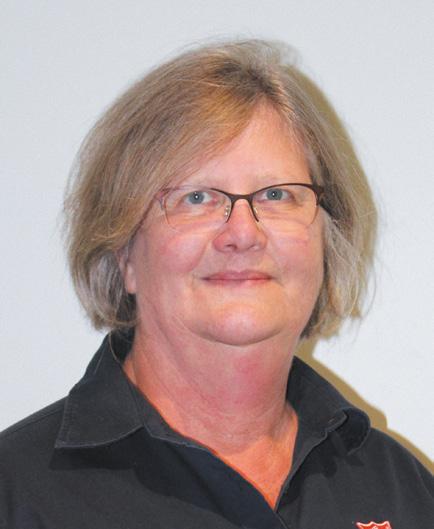
Major Susan Goldsack has been an officer for 21 years, serving as corps officer across the country for 17 years, as well as at divisional headquarters. Susan brings organisational understanding from involvement on the territorial Moral and Social Issues Council (MASIC) and Territorial Management Board. Susan serves with a keen eye to people’s growth and development through use of the CliftonStrengths tool and spiritual direction, wanting to see people thrive in the uniqueness that God has created each person to be.
Captains David and Denise Daly have been officers for 14 years. Together they have served in corps, divisional and territorial leadership roles. They are presently area officers together in Auckland, having been an inaugural part of the pilot for the Local Mission Delivery model.
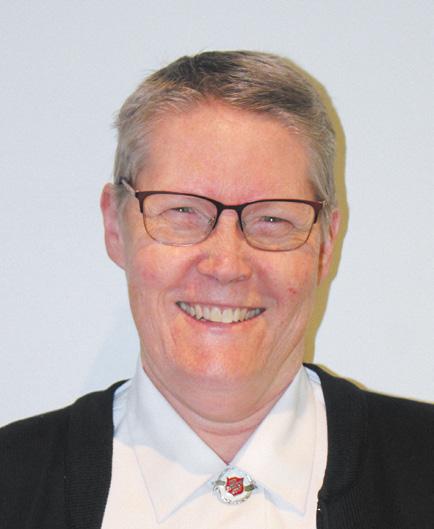
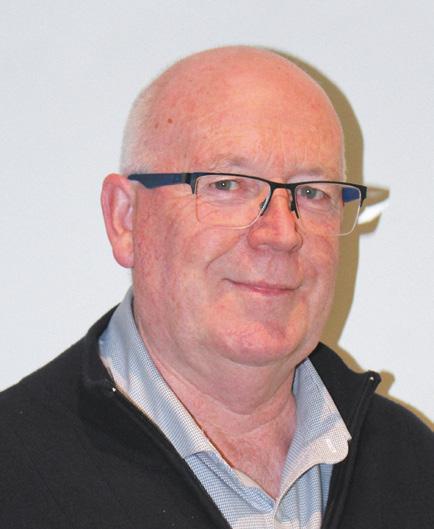

Lt-Colonel Jennifer Groves has served as a Salvation Army officer for 34 years. Her ministry has been varied, with a strong focus on youth and children’s ministry, training, prison chaplaincy and administrative roles. Jennifer has recently returned to New Zealand after many years in international service.
Captain Kenneth Walker has served as a Salvation Army officer for the past 15 years. A further 14 years
prior to this were spent serving in full-time ministry roles within The Salvation Army. Most of this time was in corps appointments in the South Island, however, recently Kenneth served a four-year term in Tonga as regional commander.

Captain Nathan Holt has served in full-time ministry for The Salvation Army for 21 years, which includes 11 years as an officer. Nathan has spent seven years as a corps officer and three years as a divisional youth secretary, as well as emergency services coordinator, and has served as a candidates secretary. The last two years have been as area officer for Te Tai Tokerau (Northland) under the Local Mission Delivery pilot.


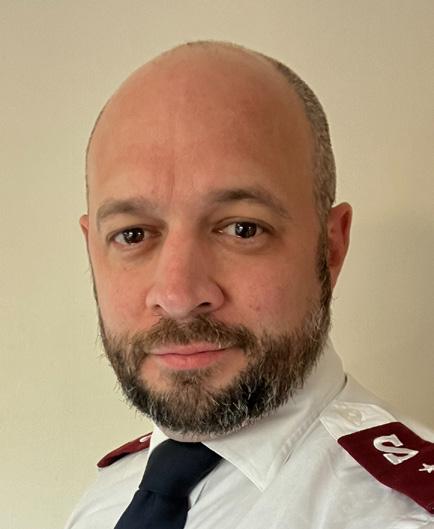
Major Stuart Tong has been an officer for 15 years. Stu has served eight years as a corps officer and seven years in Booth College of Mission and divisional roles. Stu’s focus in these roles has been finding ways for people to meet Jesus, with a particular focus on how people develop their relationship with Jesus.
Captain Jordan Westrupp has been an officer for 11 years, having served in corps and divisional roles, with a particular passion to see the next generations equipped for ministry. Jordan has also been instrumental in the re-establishment of the Hamodava Fairtrade coffee brand.
saltmagazine.org.nz 17
God’s Call
Cadet Karen Krishnan is in her second year of Salvation Army officer training in Fiji, as part of the intake of the Champions of the Mission session. Karen gave up a career in medicine to respond to God’s call. Fully surrendered and excited about the future, Karen knows God will use all her skills and experience to help others find the same freedom in Christ she enjoys today.
I became a soldier of The Salvation Army at New Plymouth Corps, New Zealand, in 2014. I had walked into New Plymouth Corps a year earlier, as a wife and mum, and was moved by how welcoming and warm the corps officers were (then-Lieutenants Robert and Susan Adams). Over the next year, I saw that warmth and welcome extended to people from all walks of life, including a homeless man who walked off the street in his smelly clothes, yet was welcomed into a Sunday service. That day, I fell in love with The Salvation Army.
God’s call to medicine
I met Jesus when I was six years old, and as I grew into a woman, I fell increasingly in love with my Lord and Saviour. At 17, I felt God calling me to work with broken women and children, but I was too young to understand what God was saying to me.
I pursued medicine and completed a Bachelor of Medical Laboratory Science and worked as a medical scientist at the Colonial War Memorial Hospital in Suva and as a tutor at the Fiji School of Medicine. Despite my love for medicine, I felt moved by broken women and children.
In 2014, after enrolling as a soldier in The Salvation Army, I felt a strong calling towards officership but it didn’t seem to be the right time. God had placed another ministry on my heart: to help women love themselves and view themselves as daughters of the King.
Return to Fiji
My family returned home to Fiji and I started a health and wellness business, initially focusing on helping women in Fiji and the Pacific live full, abundant lives
through healthy living. Non-communicable diseases, such as diabetes, are one of the leading causes of death in Fiji and the Pacific. It broke my heart to see so many people suffering from a disease that could be prevented.
John 10:10 is a verse dear to my heart: ‘The thief comes only to steal, kill, and destroy; I have come that they may have life and have it to the full’. I believe God wants his people to live abundant lives here on earth, and that the resurrection of Jesus has made that possible for us. But we don’t live that life of abundance when we suffer from diseases. It became my mission to help people live healthy, abundant lives in Fiji and the Pacific.
God’s call to the Army
I had started my postgraduate studies in Lifestyle Medicine at the American College of Lifestyle Medicine when I strongly felt the Holy Spirit’s prompting to apply for officership. This was in 2020. I was a solo parent, loved my work and was excited for the future. But I could not ignore the roaring fire God had placed in my heart. He was calling! So I applied, believing I had done my part, and trusted I would be accepted someday in the distant future when the time was right.
In 2022, I went through the process of interviews but kept thinking I was being called for a future time. One morning, my life changed when I received the call that I was accepted to attend the School for Officer Training in Fiji. I was planning on sitting for my final exams as a lifestyle medicine practitioner, and I had a huge decision to make. I chose Jesus!
18 June 2024

God had placed another ministry on my heart: to help women love themselves and view themselves as daughters of the King.
Three months later, I had closed my business, packed up our belongings, and my daughters and I moved to the School for Officer Training campus. My God had called. The time to answer was now, and I could not deny that. I love my Jesus more than life; I am willing to follow him even when it doesn’t make sense to me.
Ephesians 3:20–21 says, ‘Now to him who is able to do immeasurably more than all we ask or imagine, according to his power that is at work within us, to him be glory in the church and in Christ Jesus throughout all generations, forever and ever!’ I believe Jesus will do immeasurably more than I ask or imagine with the little I have to offer, to build his kingdom and for his glory. I trust him.
Above: Cadet Karen Krishnan (centre) with her daughters.
Trusting Jesus in the valleys
My Saviour has walked with me through the various seasons of my life. Some of these seasons have been so heartbreaking that I didn’t think I would live to see the next day. Seasons that brought darkness and heart-wrenching pain. My Jesus walked with me through it all. He is my shepherd. When he called me to serve in The Salvation Army, I could not say no. I belong to my Lord. It is an honour to serve him. I still believe in John 10:10. I believe that through the resurrection power of Jesus, we can live abundant lives here on earth.
Fiji is battling a lot of darkness. Addiction to drugs is robbing our people of a life of abundance. Our nation is bound by chains of addictions; chains that can only be broken by the power of Jesus. I pray he will use me to bring freedom and hope of an abundant life through the power of the gospel. Jesus has my surrender.
saltmagazine.org.nz 19
A Season for Everything
The Salvation Army in Aotearoa is currently rolling out the most significant structural change since its commencement over 140 years ago. Richard Kerr-Bell, The Salvation Army’s tumu whakarae (national Māori director) for te Rūnanga nationally, explains the meaning and symbolism behind the new names Tai Timu (Southern Division) and Tai Pari (Northern Division). Drawing on the invitations from God to take time to reflect, remember and give thanks embedded within Matariki celebrations, Richard offers some wisdom for navigating this season of change.
WORDS Jules Badger
here is a time for everything, and a season for every activity under heaven’ (Ecclesiastes 3:1).
In Aotearoa, the rising of the star cluster known as Matariki (the Pleiades of the South Pacific), on the darkest night of the year, heralds the dawn of the Māori New Year. Matariki is visible for most of the year but sets in the west for a month in the early evening in May, and periodically in June, rising again in the predawn sky of June or July. And on Friday 28 June, all who call New Zealand home receive the gift of a public holiday and with it the invitation to pause and give thanks.
Iwi (tribes) use different visible stars to signal this seasonal change across Aotearoa. Tainui iwi, in the central North Island, use Rerehu, also known as Antares. Southern iwi are looking for a different star— Puaka, known as Rigel, the brightest star in Tautoru (Orion’s Belt) which signals the start of winter and the end of the muttonbird and tuna harvesting season.
Disconnect to reconnect
Richard Kerr-Bell (Ngāpuhi | Te Rārawa | Te Aupōuri | Ngāti Kuri) observes that increasingly, New Zealanders are embracing Matariki as more than just a day off— it’s a time for reflection and celebration.
‘Matariki is a time for gratitude and to give thanks,’ says Richard. ‘It’s an invitation to disconnect from distractions that draw us away from God and dominate the still moments in our lives—and instead reconnect with the Spirit and with creation. Matariki is also a time to be together as whānau and remember those who have passed away. This may bring up some sadness for us, but those vulnerable moments give us a chance to keep stories alive and retell whakapapa (genealogy). Matariki can be a deeply significant time.’
In our ‘open 24/7’ world of digital distraction, Matariki also invites us to notice and re-engage with the natural rhythm of creation. Richard suggests that, ‘There’s joy to be found in God and within the changing of seasons. Matariki allows space for us to be still and reflect on our relationship with God, and it encourages us to consider what the seasonal changes around us have to say to us about our spiritual life. Matariki also provides an invitation to sit peacefully together and reflect on the true state of our lives. It challenges us to notice how long it’s been since we really noticed what the sun or the wind or the rain feels like on our skin. Are we grounded in God and
20 June 2024

on the earth that God created? The same earth Jesus walked upon as flesh and blood.’
Light from the darkness
The Matariki star cluster is mentioned three times in the Bible—twice in the book of Job, and again in Amos 5:8. ‘He who made the Pleiades and Orion, who turns midnight into dawn and darkens day into night, who calls for the waters of the sea and pours them out over the face of the land—the Lord is his name.’
Obviously, here in the Southern Hemisphere we celebrate Matariki in the depths of winter. In the Northern Hemisphere, Christmas takes place at the exact same point in the lunar calendar—winter
‘The tide is turning, and just as both tides promote growth and the dispersal of rich nutrients to sustain life, I believe God is calling us back into community and collective unity.’
solstice. Our location means we celebrate the birth of Christ at the height of summer and miss the deep symbolism of the light coming out of the darkness.
‘As the seasons change, how we respond is discernable— if we take time to notice, that is,’ suggests Richard. ‘As the temperature drops, we put on coats and shoes, and we stay indoors more. When we go outdoors, it’s for shorter periods of time. We eat more hot meals and of course if you’re a squirrel you store nuts! But there are clear signs that the season is changing and when we take the time to notice, there’s an invitation to also reflect on the changing seasons of our lives.’
As we head into this season of significant change within The Salvation Army in New Zealand, many of us will likely vacillate between excitement and uncertainty about the future. With special thanksgiving services taking place around the country as the four divisions are dissolved, Matariki offers a timely opportunity to push pause and allow God to fortify us.
Seas of change
The Salvation Army in New Zealand is moving from four divisions to just two, with each division comprised of ‘areas’. There are seven areas and these
saltmagazine.org.nz 21
areas, with their corresponding area officer and area leadership teams, are the beating heart of the changes. So while the divisions will not function as they have in the past, the imagery behind the new names Tai Timu (Southern) and Tai Pari (Northern) not only conveys the interdependence of vision, values and mission, but Richard also explains the connection they have with Matariki.
‘I really love the divisional names. Tai Timu is the ebb tide, or low tide; and Tai Pari is the high tide, or incoming tide. The tide comes in and goes out and is also affected by the changing seasons. In the Matariki star cluster, there are three stars that specifically relate to water. Waitā is fresh water, and the creatures and plants that live in our bodies of fresh water. Waitī is the ocean and the more salty, tidal waters. And Waipunarangi is the water that comes from the sky— rain, hail and snow. We are surrounded by water in Aotearoa, so we have an awareness of the living water around us and its beauty.’
‘It’s an invitation to disconnect from distractions that draw us away from God and dominate the still moments in our lives— and instead reconnect with the Spirit and with creation.’
Most of us will immediately grasp the significance of this tidal imagery in these new divisional names. Both tides are vitally important for the flourishing of creatures and plants that live in and around the ocean. Furthermore, our vision to be the Army that brings life is beautifully and insightfully captured within this imagery.
Richard explains that naming the divisions in this way achieves two things: ‘Firstly, it’s connecting us to mana whenua and honouring Māori stories. But secondly, it’s also acknowledging that we need to be open to God in all parts of our lives—the highs and lows. Everything has the potential to feed us and offer
life. The different tides are a metaphor that allows us to notice and experience these different elements of God’s work and character.’
Map of the two new divisions, with their component areas differentiated by tints. TAI
Ebb and flow
Richard offers further and more detailed explanation of how the high and low tides inform our current change journey.
‘There’s obvious beauty in the high tide—it’s full and flowing, and it is the best time to launch a boat and go fishing. The incoming tide brings in lifegiving nutrients from outside the area along with species that feed, protect, nourish and regenerate life during this period. The high tide is active and allows movement and protection in, on and under the water. As it turns and flows back towards the sea, the tide spreads what is eaten or carried during the low tide to other areas.
TAI PARI 22 June 2024
TIMU
‘The outgoing tide has its own particular beauty, and a number of important things happen when the tide goes out. Exposure to the sun and the elements stimulates growth at the ebb tide and changes the biochemical make-up of what is living and growing on the shore. It provides healing, goodness and sustenance for other life forms and gives unique strength and resilience qualities. The ebb tide provides access to the land and sea for other species to travel and find protection and sustenance. Some creatures require low tide to feed. All these benefits are transferred to the high tide but cannot exist without the low tide.’
‘Are we grounded in God and on the earth that God created— the same earth Jesus walked upon as flesh and blood?’
Richard adds that the tides also reveal something about the character of God and how we are spiritually formed.
‘In terms of spiritual reflection, Tai Pari reminds us of being alive to God’s Spirit in our lives—faith in action through the movement and flow of Spirit-inspired work. Change is obvious and the dynamic work of God is observable with the fruits of the ocean being harvested, shared and enjoyed,’ he explains.
‘Conversely, the ebb tide can seem like a vulnerable time, but it’s when we are most open to God’s light and love. We can’t hide our true and honest state in God’s presence. It’s like when we sit with God in prayer—it’s not passive because we are actively engaged. So often when everything in our lives is going well, it’s like high tide and we say, “thanks God!” But often we are carried on the high tide only because of what grew within us at the low tide.’
Challenge to change
Change is challenging, even when we choose it. In the first instance humans experience change as grief, but when embraced in an open and healthy way, growth occurs.
‘Faith grows and deepens through change and challenge,’ affirms Richard. ‘And Te Ope Whakaora (The Salvation Army) is going through change. The tide is turning, and just as both tides promote growth and the dispersal of rich nutrients to sustain life, I believe God is calling us back into community and collective unity. As the moon’s gravitational pull moves the tides, so the two “divisions” are moved by the Spirit of God. If we maintain an openness and keep turning our faces to the Son, to God, the grace of the Spirit will flow smoothly into our lives.’
Happy Matariki! May it be a season that brings us life as we celebrate what God has done, contemplate what God is doing, and in faith anticipate God’s goodness to come! Ki tau terangimarie o te Atua a tātou! May God bless us!
 Richard Kerr-Bell, tumu whakarae (national Māori director) for Te Rūnanga.
Richard Kerr-Bell, tumu whakarae (national Māori director) for Te Rūnanga.
saltmagazine.org.nz 23
Learning to be Mary
WORDS Captain Rachel Montgomery
ART Sam Coates
Based on Luke 10, it seems to me that the more we pack into our lives, the less we experience of life. I’ve considered for a while now that we’ve become like a modern-day Martha—busy, distracted, overwhelmed and empty. At least, I know I have. And it’s caused me to ask, how can I be more like her sister Mary—calm, focused and fulfilled?
I set out at the beginning of this year to purposefully make space in my life that would bring greater connection to God, my family, the people I love and the ministry I have. Here’s what I’ve been learning.
When I am attentive and listening, I hear God speak in the everyday moments of life.
When I stop to look and really see, I marvel at what God has made for us to enjoy in creation, even just in my backyard. I’ve taken to going outside in the morning with the sun coming up to praise God for the new day, and then in the evening giving thanks to God under a night sky full of stars.
I know time with my family brings great joy to my soul. Being present in each moment and not being caught up in my mind with tasks to be done later is something I’m continuing to work on. The people I treasure most dearly should have the best of me.
As I lean more into this Mary mindset, I am excited by the places where I get to journey alongside others, bringing hope and encouragement, seeing faith grow, and a love for God deepen.
It takes courage to try make a change when we notice something in life that doesn’t align with God’s purpose, but just as I’ve been encouraged to become more like Mary, we can know that slowing down and being more present to God and the world around us can only be a good thing.
I’m learning how to be a Mary in a Martha world.

24 June 2024


Pushing Pause: A Rhythm of Rest
In part one of this series, Major Mat Badger offers a timely and persuasive biblical framework for Sabbath rest. As New Testament followers of Jesus, there is something deeply attractive about the practice of slowing down to be with God, particularly for Christians living in the fastpaced, open 24/7, digitally-driven 21st century.
How are you doing? A simple question, and usually ‘good’ or ‘fine’ just rolls off the tongue. But how often do we take that question seriously and give an honest answer? How often do we want an honest answer? But an honest answer often reveals that many people are tired—some deeply fatigued. Others are anxious, stressed and busy— including followers of Jesus.
Have you noticed that in the world of today, being a workaholic is socially acceptable? In fact, the one commandment that we consistently break and often brag about breaking is the commandment to rest. We
wear our busyness like a badge, and all but dismiss the commandment to rest. Why?
When we say we are busy, what we are trying to say (without being entirely cognisant of it) is that we matter. We’re trying to communicate that we are contributing and that what we do has value. Society reinforces this dangerous idea that if you are not busy then you don’t have value. This toxic way of thinking is harming us. John Ortberg writes, ‘Busyness is not just a disordered schedule, but a disordered heart’.
If you are reading this, you are likely a Salvationist or connected somehow
with the work of The Salvation Army. And we are an activist movement! The service we provide to the wider community, and ministry to one another, is immensely important. We boldly claim that we are the Army that brings life! And yet burnout persists in our ranks and with our staff. This is not what we want, and so we need to give serious thought and attention to how we can reverse this trend.
Corrie ten Boom famously said, ‘If the devil can’t make us bad, he’ll make us busy’. Both busyness and sin dull our awareness of the Holy Spirit and cut us off from the life God has planned for us. This is why
26 June 2024
proactive rest God’s way—soul rest— is important for all of us.
First things first
In the Bible, Genesis 1 starts ‘In the beginning God created the heavens and the earth... God saw all that he had made, and it was very good. And there was evening, and there was morning—the sixth day’ (v31). And in Genesis 2:1–3 we read, ‘Thus the heavens and the earth were completed in all their vast array. By the seventh day God had finished the work he had been doing; so on the seventh day he rested from all his work. Then God blessed the seventh day and made it holy, because on it he rested from all the work of creating that he had done.’
Notice that God rested. God rested. Take that in for a moment! God rested. The word ‘rested’ is ‘shabbat’ (sha-vot) in Hebrew. It is where we get the word Sabbath from, and it literally means to stop. To cease. To finish. God wasn’t worn out or burnt out. The idea is that the rest God chose was something enjoyable. In fact, the word ‘shabbat’ can also be translated as ‘delight’.
Rabbis point out that the use of language here is odd, because not only did God rest, but by resting he created rest. Rest comes from God. It was God’s idea. God worked for six days and then he rested, and in doing so he built a rhythm of rest into the fabric of creation. And God extends the invitation to us.
Interestingly, studies show that human productivity drops off around the 50-hour mark in any week—which is of course about six days of work.
A reputable American study showed that Seventh-day Adventists live 11 years longer than the average person in America. A doctor calculated that
if you add up the time devoted to practising Sabbath it comes to about 11 years. He hypothesised that for every day you Sabbath, you get that day added back to your lifespan!
When we choose not to rest, or to practise any resemblance of Sabbath, we suffer the consequences. We may experience anxiety, sleeplessness, persistent illness, high blood pressure, a lousy immune system, poor mental health, burnout and even shallow relationships and a sense of disconnectedness from others and God. If we are not intentional about rest, sickness becomes Sabbath. As one teacher put it: ‘You can’t fight Sabbath rhythm any more than you can fight gravity—it just is.’
‘Busyness is not just a disordered schedule, but a disordered heart.’
Blessed and holy
In Genesis we see that God blesses three things: animals, people and the Sabbath. The blessing given in the first two instances is the ability to procreate—be fruitful and multiply. In the case of the Sabbath, the principle is the same. God blesses the Sabbath to give us life through rest.
Not only does God bless the Sabbath, but God also makes it holy. This is the first time the word ‘holy’ appears in the Bible. Scholars suggest that when something is first mentioned, it is essentially a definition.
Furthermore, what we miss as 21st century followers of Jesus is that to those first listeners in the ancient Near East, the fact that God blessed
If we are not intentional about rest, sickness becomes Sabbath.
and made holy a period of time was of huge significance and even controversial. In the ancient Near East, the gods and goddesses were found in a physical space like a temple or a mountain shrine, but not in time. The seventh day that God blesses and makes holy is not physical architecture but the architecture of time itself. This is what separates the God of the Bible from all other gods. There is no need to climb a mountain or go on a pilgrimage, we just need to stop and rest—God is right here, right now, in the architecture of time itself. So Sabbath is coming, whether we choose it or not. Rest will come either through proactive and intentional soul rest, or it will be forced on us through sickness or burnout. What choice will you make? Will it be a Sabbath of delight or of brokenness? Will you welcome it or fight it? Is there an invitation for you to reduce your speed—slow down and stop for a while—to find rest for your soul in God’s presence?
Based on a sermon series given at Johnsonville Corps. For full sermons, go to tinyurl.com/ TSAJohnsonville
Mat’s recommended reading: The Ruthless Elimination of Hurry by John Mark Comer. Buy at tinyurl.com/JMCEliminateHurry
saltmagazine.org.nz 27

Healthcare for All
The Salvation Army’s Hauora Service provides affordable healthcare for the South Auckland community—and everyone is welcome to sign up. Ben Mack reports.
Compassionate, affordable and inclusive healthcare is something many of us would like for ourselves and our whānau (family). The Salvation Army offers just that for people living in South Auckland. Even better, the Hauora Service is now accepting new patients.
‘Hauora’ refers to a specific approach to healthcare that incorporates individual wellbeing. It allows for patient-centred care that goes beyond just treating physical conditions, but looks at the entire person, explains Practice Manager Bhoomesh Shreedam.
Hauora Service is The Salvation Army’s first medical centre in Aotearoa and opened in the Tāmaki Makaurau/ Auckland suburb of Royal Oak in September 2023. Hauora Service is available to everyone in the local community—meaning everyone living in Tāmaki Makaurau is welcome to sign up.
Bhoomesh emphasises the inclusiveness of Hauora Service, and its traumainformed understanding that doesn’t discriminate.
‘There is a crisis in the GP world,’ he begins. ‘Many GPs who own their own clinic might not want to spend an hour with a patient for a consultation that should take 10 minutes. But we don’t discriminate.’
Bhoomesh, along with Emma Hunter— national consumer advisor and project lead for setting up Hauora Service—are also both quick to point out that the clinic is very clean and safe, particularly for whānau with tamariki (children), including pēpi (babies).
Emma points out the affordability, safety and inclusion that Hauora Service offers to people and their whānau. There’s another important aspect, too, she explains: the great deal of experience the practitioners have in
treating people, demonstrated in both their medical expertise and the dignity and respect they show their patients.
It’s a service that’s already making a positive difference in people’s lives and the lives of their whānau.
‘As soon as I saw the Hauora Service opening, I was keen to transfer GPs,’ says Lois, among the many people now served.
‘I love their holistic approach and cultural appropriateness, and I feel the welcome and warmth from all the staff. The lovely receptionist, who remembered my name, reminded me that I needed to do my routine blood test, which gives me a sense of belonging to the practice.’
She adds: ‘I love what these guys are doing and what The Salvation Army as a whole stands for.’
The medical centre is located at 691A Mount Albert Road in Royal Oak. Services
28 June 2024
available include adult and child medical care, mental health management, general health and wellness, cervical screening, immunisation, lab results, Tamariki Ora health checks, chronic disease management, sexual health check-ups and more.
Bhoomesh says Hauora is a wraparound GP service, which supports the whole family. This can mean care that goes far beyond just the physical.
‘We look not only after medical needs, but work closely with Salvation Army Community Ministries to help with needs like WINZ (Work and Income), housing and more.’
He says more about this and the importance of wraparound support.
‘It’s about getting the right services and support.’
If whānau are struggling with finances, budgeting support is available, meaning that people can still receive Hauora services despite any money challenges they might have.
‘We’ve seen a really positive approach with this,’ says Bhoomesh.
‘Many clinics ask for payment on the day, which can push people further into debt. It’s an accessibility problem if you’re already struggling to buy food. With Hauora Service, we’re removing barriers.’
Another advantage of signing up to the service is being able to see a GP or nurse quickly.
‘Medical centres in the area currently usually have three to four week waiting lists for appointments,’ Bhoomesh says.
‘We have on-the-day appointments for enrolled patients.’
Government rules mean new sign-ups are limited to people and their whānau living in Tāmaki Makaurau. Both
Bhoomesh and Emma say it’s a good option for people and their whānau who do live in the area, particularly if finances are a concern or if someone is distrustful of the health system because of bad experiences in the past.
Hauora Service’s patients have been spreading the word in the local community, too.
‘I have been telling all my friends at the gym to join the Hauora Service, as this is the only medical centre I know where the doctors are not rushing clients out and you really feel listened to,’ says Paul, a Hauora patient.
‘The receptionist is great, too; she knows most of the clients by name. And the doctors are very experienced and knowledgeable.’
Paul adds: ‘I wish we had more GP practices like this for the whānau out there.’
Addictions, Supportive Accommodation and Reintegration Services (ASARS) National Director Lt-Colonel Rod Carey said something similar when Hauora Service opened: ‘We recognise that many individuals face challenges in accessing professional healthcare. We provide a service that specifically meets the needs of tāngata whaiora (living people), ensuring that nobody is left behind.’
Opposite page: the reception area of Hauora Service in Royal Oak. This page: one of the patient rooms.

More information, including how to sign up, is available online at hauoraservice.salvationarmy.org.nz by calling (09) 220 8888 or emailing hauora.service@salvationarmy.org.nz
saltmagazine.org.nz 29
Anzac at Johnsonville
Johnsonville Corps (church) commemorated Anzac Day with a community service which drew a large crowd of over 350 people. ‘We enjoy giving back to our community and want to continue to do so for many years,’ says organiser Major Glenton Waugh. Festivities began with a parade down the main road featuring armed services and community groups, led by the Wellington Red Hackle Pipe Band. Captain Shaun Baker shared a poignant address; Glenton led the prayers and Liam Kendrew was MC for the event. Wreaths were laid on a specially decorated podium as head students from Newlands College read ‘In Flanders Fields’.
For the full story, go to saltmagazine.org.nz
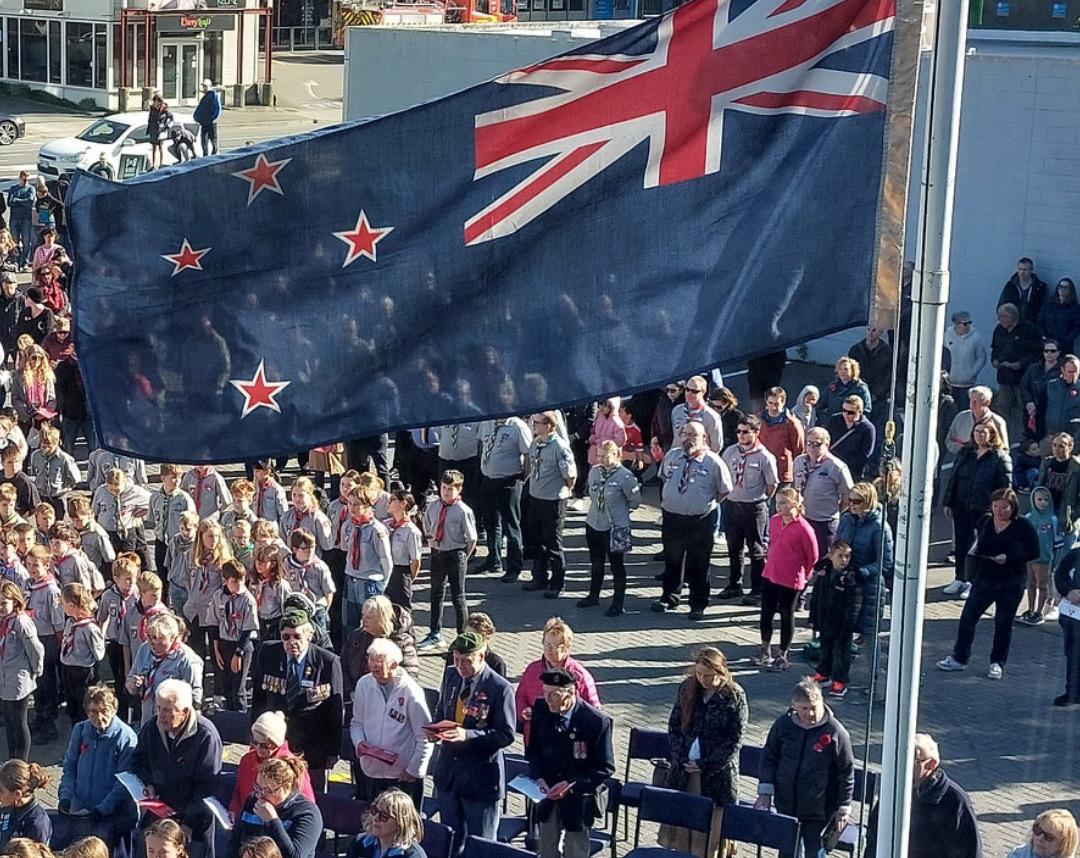
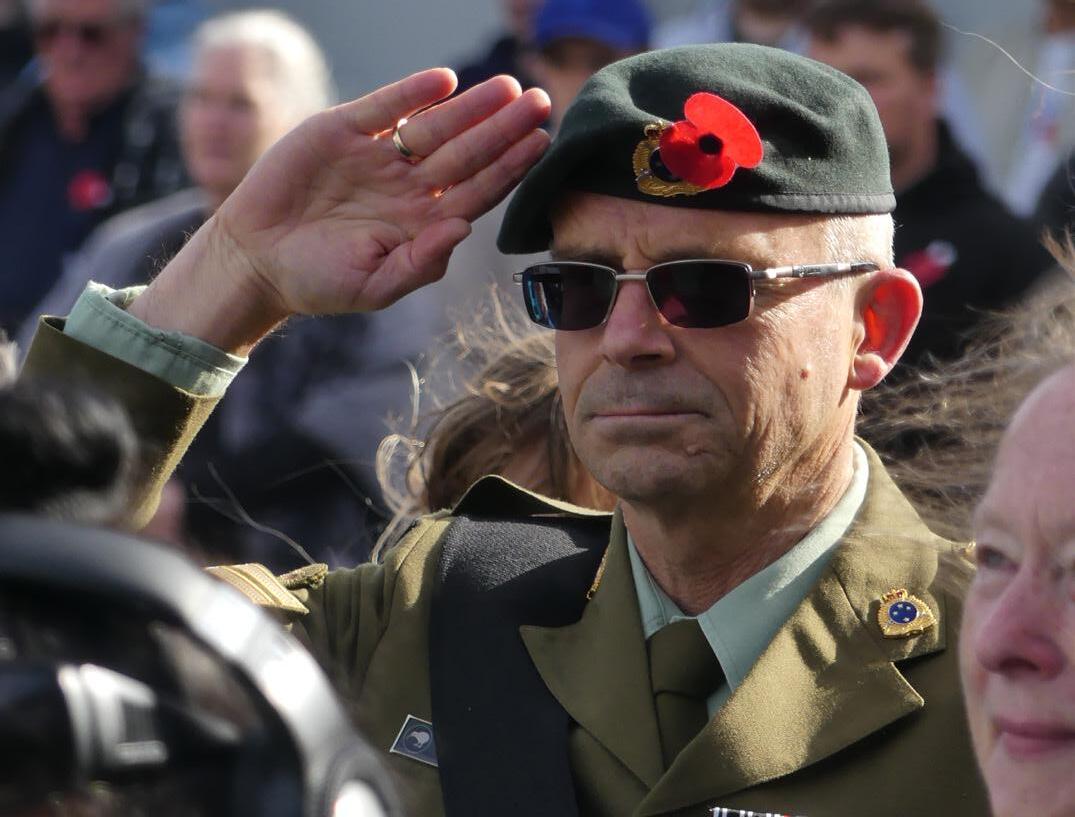
Junior soldier rally in Nuku’alofa
A junior soldier rally took place in Tonga on Friday 26 to Saturday 27 of April, held at Nuku’alofa Corps, with 36 children and seven leaders attending. Friday evening activities included board games and Sally Telly activities, while 18 people participated in an art and paint competition based on the theme of ‘grow’. Fourteen-year-old Asinate Pasi, who is a junior soldier helper, shared a powerful testimony with the children. Later there was a field trip to a tree nursery—an entirely new experience for some children. The junior soldiers then participated in a tree planting project on the corps grounds, before heading home.
For the full story, go to saltmagazine.org.nz
Loitering with intent
Kāpiti Salvation Army Community Ministries Manager Christoph Zintl’s volunteer chaplaincy work with the Wellington Phoenix is about much more than football. ‘Loitering with intent’ is how Christoph describes a typical Friday for him. ‘What I do is soul care on and off the pitch,’ he says. Christoph spends time with the Phoenix’s development team—some of the players are as young as 14. At such a young age, the pressure to perform well and potentially become professional football players is immense. ‘Listening is a key part of what I do. Most of the conversations when I’m involved aren’t actually about football.’
For the full story, go to saltmagazine.org.nz
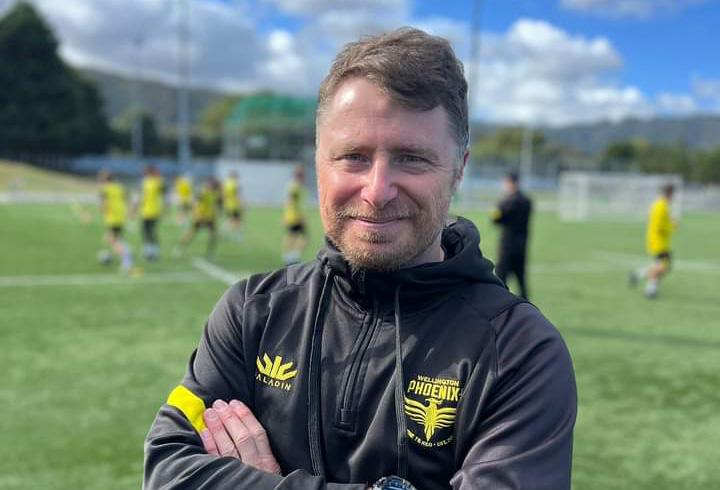
30 June 2024
Tools to navigate LMD and CSN
On Tuesday 15 May, 60 leaders gathered at Territorial Headquarters, eager to hear more about the transition to Local Mission Delivery (LMD) and the Connected Support Network (CSN) in our territory. Territorial Secretary for Mission Lt-Colonel Ian Gainsford emphasised that the intention is for the frontline to be supported by the organisation and for the CSN to have a role in setting parameters for how the entire organisation (frontline and back office) will operate. Greg Foster, director of Social Housing and Property, said, ‘Lots of good ideas were shared on how to engage a distributed team and how to encourage staff to be better connected with the rest of the organisation’.
For the full story, go to saltmagazine.org.nz
Gathering at Christchurch City
Christchurch City Corps celebrated their inaugural ‘The Gathering’ event in March this year. ‘Our aims were to bridge connections between those who attend our community programmes and our church family, and to encourage people to draw closer to Jesus,’ says organiser Lieutenant Aimee Noakes. The evening included the opportunity to creatively explore a biblical theme, and to participate in celebration, story, prayer and song. More than 100 intergenerational attendees also enjoyed a delicious meal together.
‘We are so thankful to God for this event, and we are excited to see the fruit of connection and relationships with people in our local community,’ says Aimee.
For the full story, go to saltmagazine.org.nz
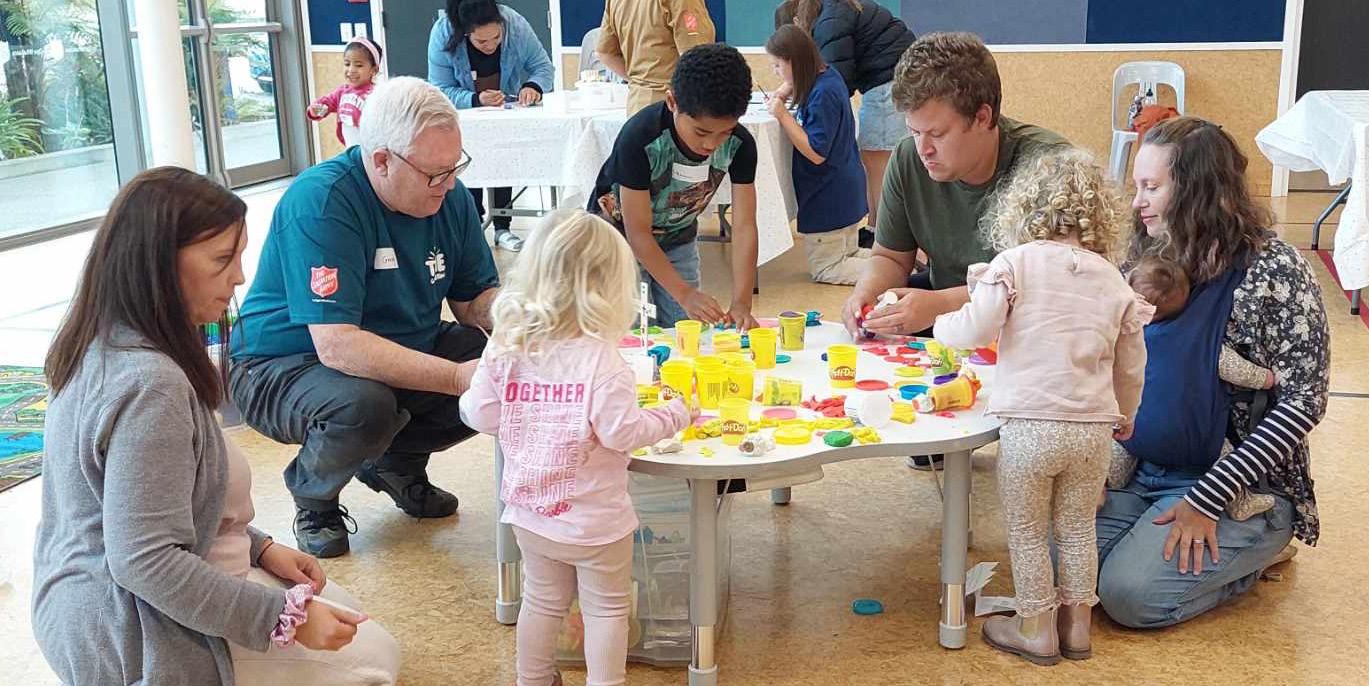
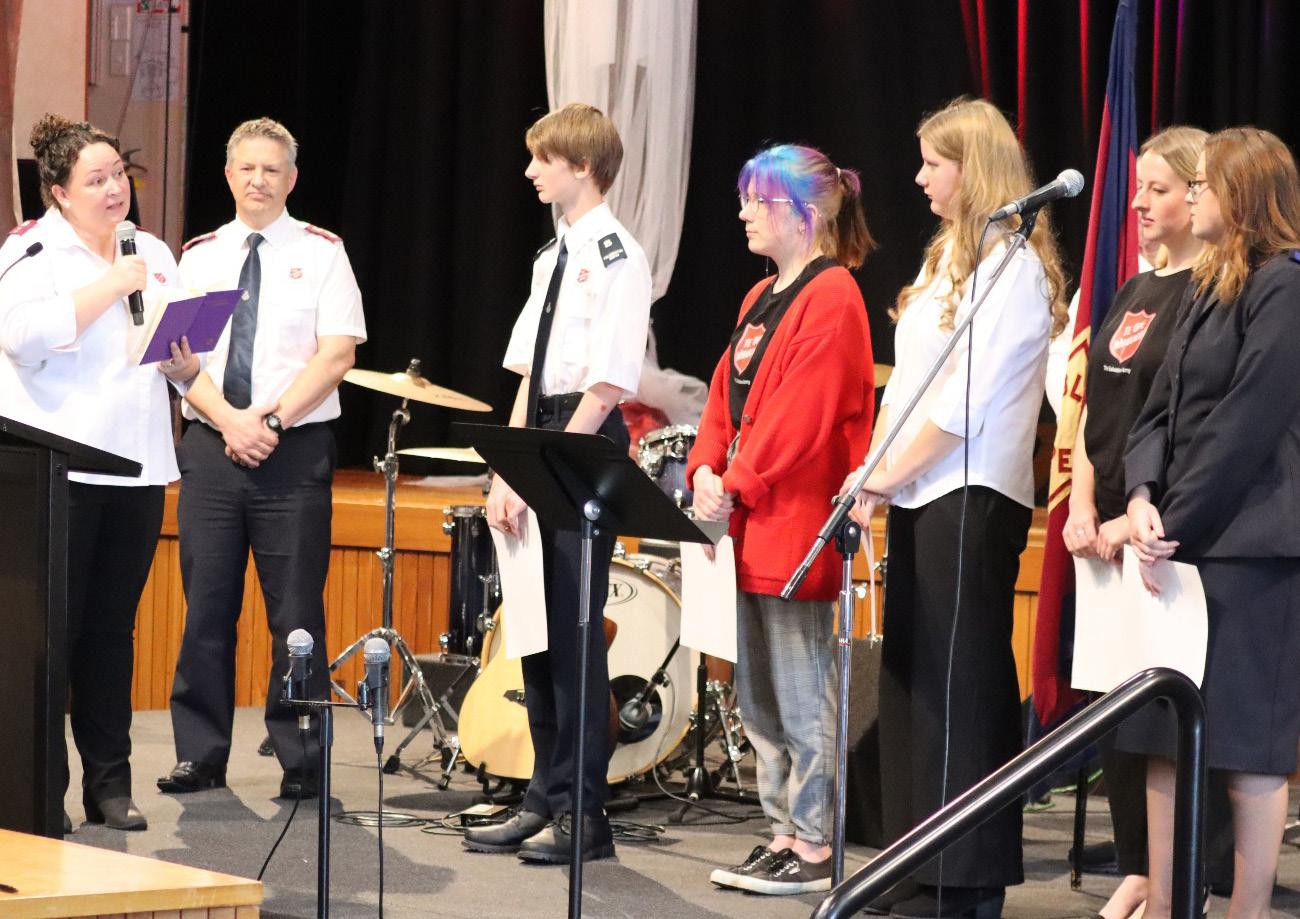
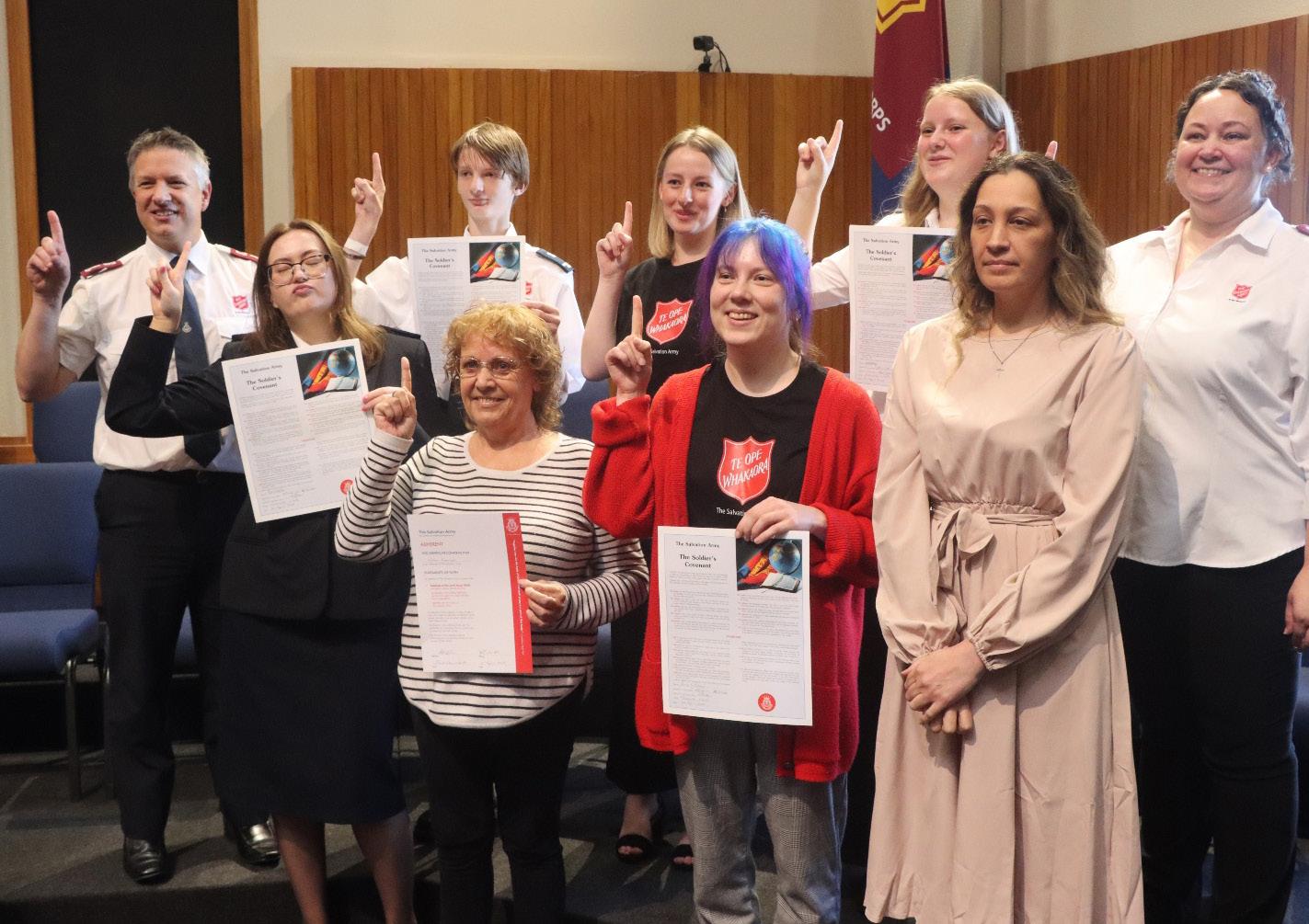
More enrolments at Palmy Army!
On Sunday 21 April, five new soldiers and two adherents were enrolled at Palmerston North Corps—many of whom are young people. Hot on the heels of seven enrolments back in November, something good is clearly going on in Palmy! Captain Sammy Millar says, ‘It was wonderful to enrol these people who have publicly declared their faith in Jesus and who are choosing to serve him in this part of the Body of Christ. There is growing momentum to get involved and advance God’s Kingdom. They want to grow as disciples of Jesus, and soldiership is a significant part of that journey.’
For the full story, go to saltmagazine.org.nz
Looking for more news?
Read the latest news online at saltmagazine.org.nz
saltmagazine.org.nz 31
Official Engagements
Commissioners Mark (Territorial Commander) and Julie Campbell (Territorial President of Women’s Ministries)
5 June: Opening of SASH units, Thomas Burns Street, Dunedin (Mark only)
9 June: Divisional Rally, Levin | Celebrating the Central Division 1994–2024
13 June: Recovery Church, Newtown
14 June: Meeting with Prime Minister and church leaders, Auckland (Mark only)
16 June: Christchurch City Corps visit
18 June: 5-year officer review, Booth College of Mission
Colonel Gerry Walker (Chief Secretary)
4 June: Grandview Corps visit, Hamilton
5 June: Waikato Bridge visit, Hamilton
6 June: Tokoroa Corps visit
7 June: Territorial online Praying Together meeting
9 June: Divisional Rally, Levin | Celebrating the Central Division 1994–2024
13 June: Central Divisional Headquarters event, Wellington
Lt-Colonel Liz Gainsford (Territorial Secretary for Spiritual Life Development)
7 June: Territorial online Praying Together meeting
9 June: Divisional Rally, Levin | Celebrating the Central Division 1994–2024
and her stepchildren, Lynette, Thelma, Kevin (deceased) and their extended families at this time of grief and loss.
Bereavement: Hemi Manuera Pomare, the father of Captain Hana Seddon, passed away in Tāmaki Makaurau (Auckland), on 12 May 2024. We ask you to uphold in karakia/prayer Captain Hana Seddon and her whānau at this time of grief and loss.
E te pou, e te ringa raupā, Kua mutu te mamae i āianei, Haere ki tō Pāpā, ki tō tātou kāinga tūturu, Takoto mai rā i roto i te aroha o te Atua. (Acknowledging you, strong and grounded, of many years of experience and toil, now free from pain. Farewell to you, returning to our ancestral home. Rest in the love of the Lord).
Margaret Sharland, the mother of Major Denise Crump, and the grandmother of Lieutenant Aimee Noakes, passed away in Nelson on Tuesday 14 May 2024. We ask you to uphold Majors Denise and Stephen Crump and Lieutenants Aimee and Scott Noakes, and other extended family members in your prayers during this time of grief and loss.
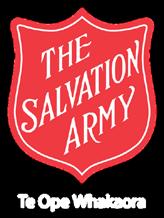
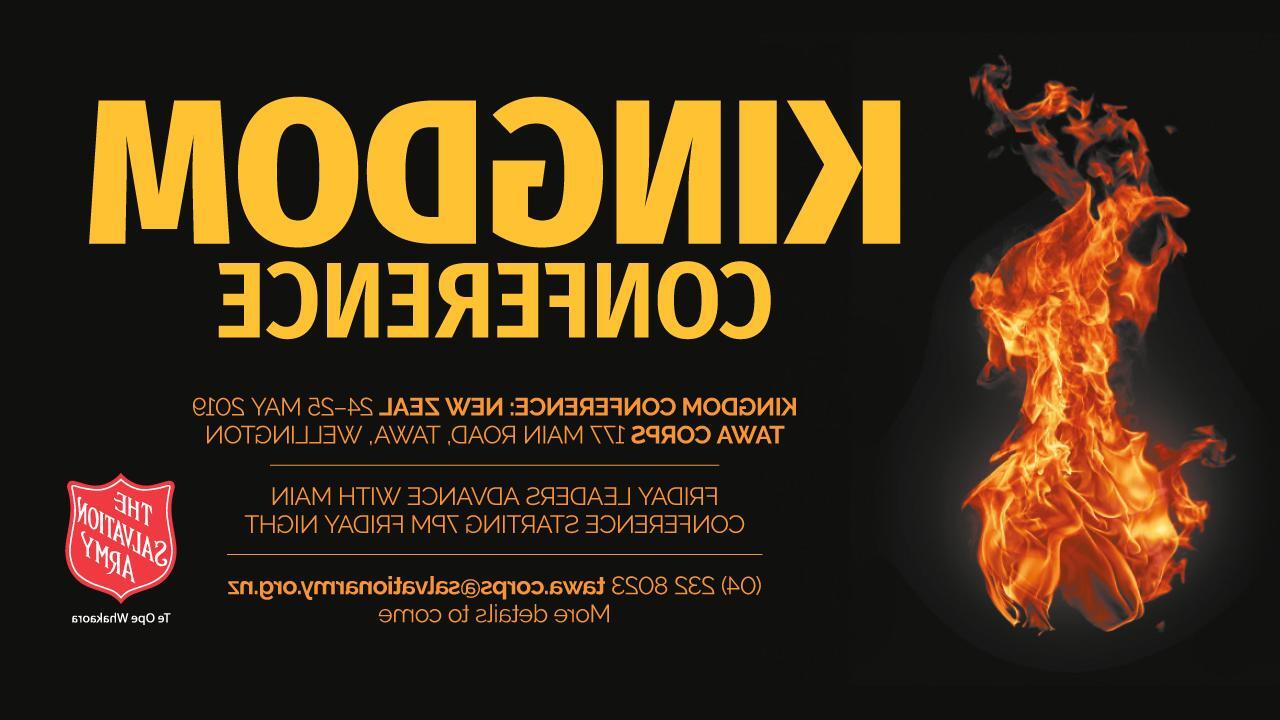
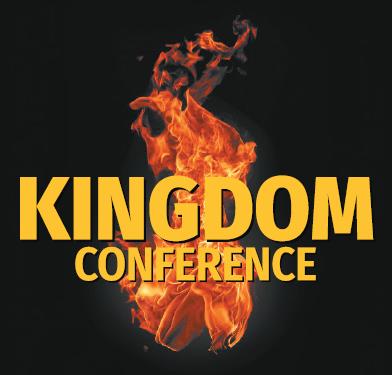
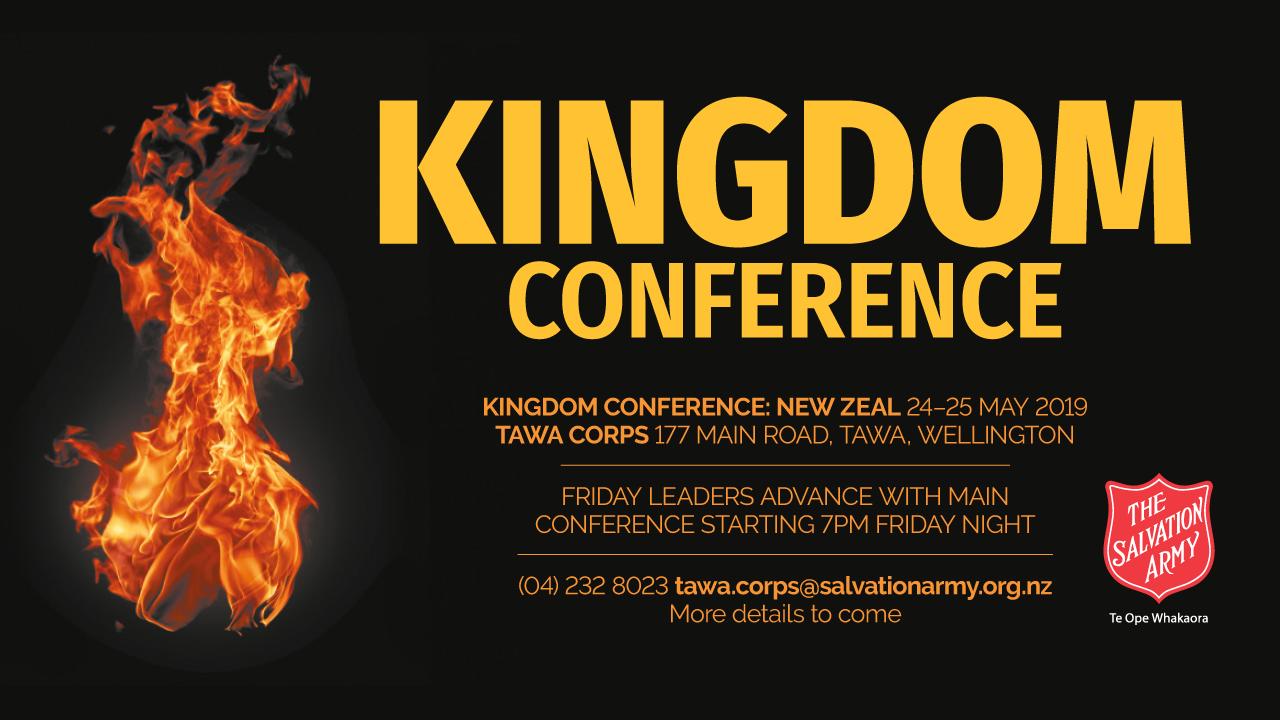
1260 days, 3. Vexillologists, SAVE THE DATE SAVE THE DATE THE SALVATION ARMY THE SALVATION ARMY PALMERSTON NORTH PALMERSTON NORTH 4th-6th OCTOBER 2024 4th-6th OCTOBER 2024 REGISTRATIONS OPEN SOON! REGISTRATIONS OPEN SOON! CHILDREN’S PROGRAMMES AVAILABLE CHILDREN’S PROGRAMMES AVAILABLE STAY THE COURSE STAY THE COURSE 32 June 2024
SALVATIONISTS IN HISTORY
A Stitch in Time
This is the final of our three-part series on the work of Nola Bradwell in her preparations for setting up The Salvation Army’s archives, as told in The crafts of cloth, needle and thread: Nola’s Story, written by her daughter Helen May (abridged).
In 1995, I [Helen] shifted back to Wellington from Hamilton and Nola’s letters stopped. I was busy settling into a new position at Victoria University and didn’t recall much about Nola’s work at the archive. Her health was deteriorating and between 1995 and 1998 Nola kept a diary, recording how she was feeling, her medications and daily activities. The diary petered out in early 1998 and Nola died in June. It was not until 2021 and starting to think about Nola’s Story, I read her diaries and was amazed at the busy life she had led despite her health setbacks, pain and discomfort.
During the years 1995 to ’96 in particular, Nola frequently mentions time spent at ‘THQ’, meaning the archive, and often working with [Commissioner] Marjorie Goffin. They were sorting and mounting all the badges, but also cataloguing and labelling photographs.
Taking the year 1996 as an exemplar, a selection of brief comments about the archive from Nola’s daily one-page diary entries give a glimpse of their work: I went to THQ today and Marjorie and I covered some promoted to Glory boards [listing deaths] and tried to work out how we would do the badges (26 February 1996).
Went to THQ and worked on badges … Made pikelets for THQ. Made three more covers for the promoted to Glory boards (3 March 1996).
Marjorie and I sorted out uniforms (14 May 1996).
My back is a little better. Went to THQ and finished General [Frederick] Coutts’ collar (7 July 1996).
I had my lumbar spine Xray then went back to THQ and got the General’s bonnet ribbon

from London. It is lovely and given with their compliments (24 July 1996). [The ‘General’s bonnet ribbon’ is a mystery but could be referring to the General’s wife who would have worn a bonnet with a ribbon band.]
By 1997 there are fewer entries about the archive, but Nola was still doing a range of tasks. The last entry mentioning the archive was on 20 October 1997: ‘Marjorie came and we made badge boards’. However, this was to Nola’s home. She was not having a good day with a painful back and increased medication. A friend also visited with ‘gold roses’ and her friend Lillian Shepherd had rung her. Nola wrote in the diary that she ‘cooked a hot dinner’. The archive was clearly still of interest to Nola because the day’s entry concluded:
Looked in the 1932–1933 War Cry s for Mildred Suter’s account about the General’s tassel but haven’t found it. I hope for a better day tomorrow.
Cyril [husband] must have taken hard copy volumes of the War Cry home for Nola, but what the ‘General’s tassel’ is remains a mystery. Perhaps it was associated with the 50th jubilee in 1933 of The Salvation Army in New Zealand. A puzzle!
When Nola died in June 1998, there were several tributes making reference to her work in the archive.
A tribute in The War Cry (8 August 1998) by Major Alan Robb was headlined ‘A woman of the 20th century’ noting too that ‘Nola played an unobtrusive but major role in the establishment of the territorial archives in Wellington’. Citing Cyril’s funeral tribute, Robb suggested that an area of the archives could be called the ‘Nola Bradwell Uniform Collection’. And, indeed, the room housing the uniforms was later named the ‘Nola Bradwell Room’ at a small ceremony attended by our family.
saltmagazine.org.nz 33
Nola viewing uniform collection, 1994.

Welcome Winter!
The changing of seasons can be both fun and a bit sad for small children, especially when the warm weather and longer days of summer slowly give way to chilly temperatures. It can sometimes be confusing and disorienting when daylight saving ends and darkness descends earlier. As parents, we can embrace the opportunity to teach our children about God’s character and ways through the changing seasons. There are some great spiritual principles written into the very fabric of creation. Winter is often known as the ‘resting season’. It’s a time when some animals hibernate, birds fly north for the winter, the bulbs of various plants become dormant as they burrow down and await the warmth of spring. It’s a season when we generally spend more time indoors, drink more Milo or hot chocolate with marshmallows and bring out the cosy flannelette PJs, to name a few fun winter warmers. Splashing in puddles is now allowed because it’s gumboot season, and depending on where you live, ‘Jack Frost’ paints the ground white and maybe, just maybe, it snows!
Not everyone gets to experience snow, but browsing the shelves together at the library or searching online reveals winter images from around the world that can be exciting and expansive for young curious minds. A winter image that reinforces an important spiritual truth is, of course, the snowflake. No two are the same—an undisputed mindblowing miracle of God’s glorious creation that winter reinforces! Psalm 139:14 explains that we are all ‘fearfully and wonderfully made’ by God. Each of us, and every child, is unique and special to God.
set in, try
1 Design a pattern for your snowflake
2 Carefully cut it out and write your name in the centre
3 Think of six things that are special about you
4 Write those six things inside the six spikes or ‘legs’ of the snowflake
5 Notice the things your siblings or friends write about themselves
Fun snowfake facts activity winter indoor craft As begins to this great

6 Celebrate together that you are like snowflakes: no two are the same
Every snowflake is unique— there are no two identical snowflakes
7 Thank God for making you unique and special
8 Tape your snowflakes to a window so it looks like it’s snowing outside Snowflakes always have six sides
Each snowflake is made up of as many as 200 ice crystals
34 June 2024

How do snowmen pay their bills?
With cold hard cash
What do you get when you cross a snowman and a vampire?
Frostbite
How did the snowman get to work?
By icicle
Why did the boy keep his trumpet out in the snow?
Because he liked cool music
Wonderfully Made
‘For you created my inmost being; you knit me together in my mother’s womb. I praise you because I am fearfully and wonderfully made; your works are wonderful, I know that
full well.’ Psalm 139:13–14
Read: The psalmist reminds us that we are designed uniquely. God ‘knit us together’ inside our mother’s body, meaning that God took great care when he created us. Like a hand-knitted woollen jersey, every stitch was made with love and tenderness towards us.
Think: At times we compare ourselves with others or wonder what other people think of us. This can sometimes make us feel a bit sad or confused. It’s important to remember that it is okay to be different—God created us that way on purpose! We all bring something unique and special to the world. Some of us are good at drawing while others can kick a rugby goal from a long way. Some of us love reading, others love swimming. We each have different interests or passions, talents or abilities. When we understand that God made each of us wonderfully, we can thank God and encourage each other to be our unique selves!

outthis microscopic view owfak e !

Pray: Dear God, thank you for creating me unique and special. I know that I am fearfully and wonderfully made! Help me to remind my friends and family that they are unique and special, too.
Do: Next time you see a friend or sibling doing something amazing, give them a high five and tell them you’re glad God made them with that special talent or ability.

saltmagazine.org.nz 35

There is no better exercise for your heart than reaching down and helping to lift someone up.
There is no better exercise for your heart than reaching down and helping to lift someone up.
Bernard Meltzer
Bernard Meltzer




































 Richard Kerr-Bell, tumu whakarae (national Māori director) for Te Rūnanga.
Richard Kerr-Bell, tumu whakarae (national Māori director) for Te Rūnanga.




























